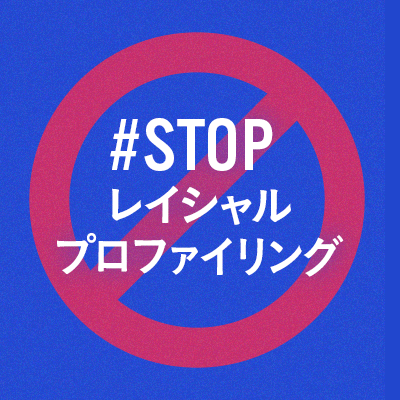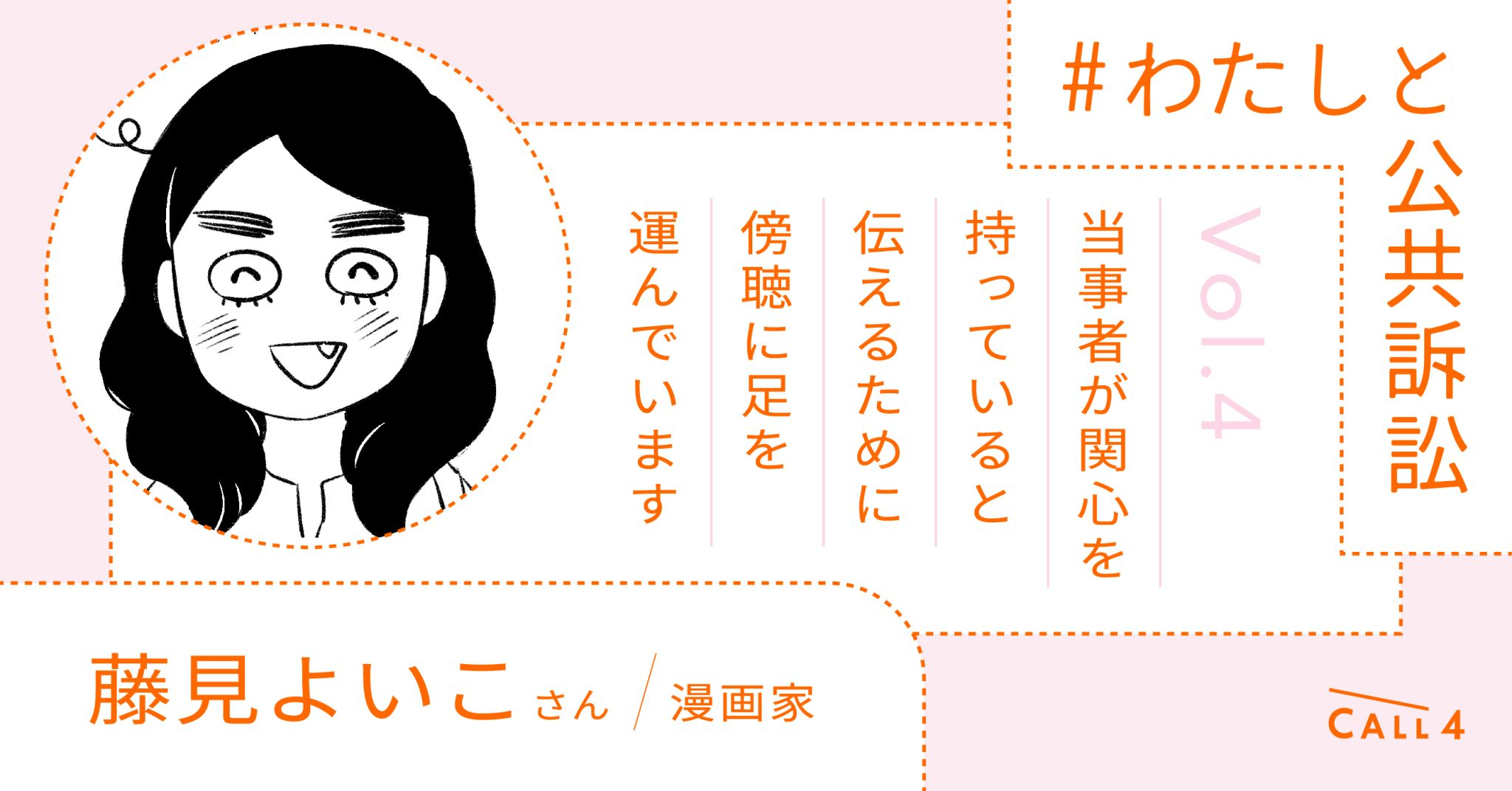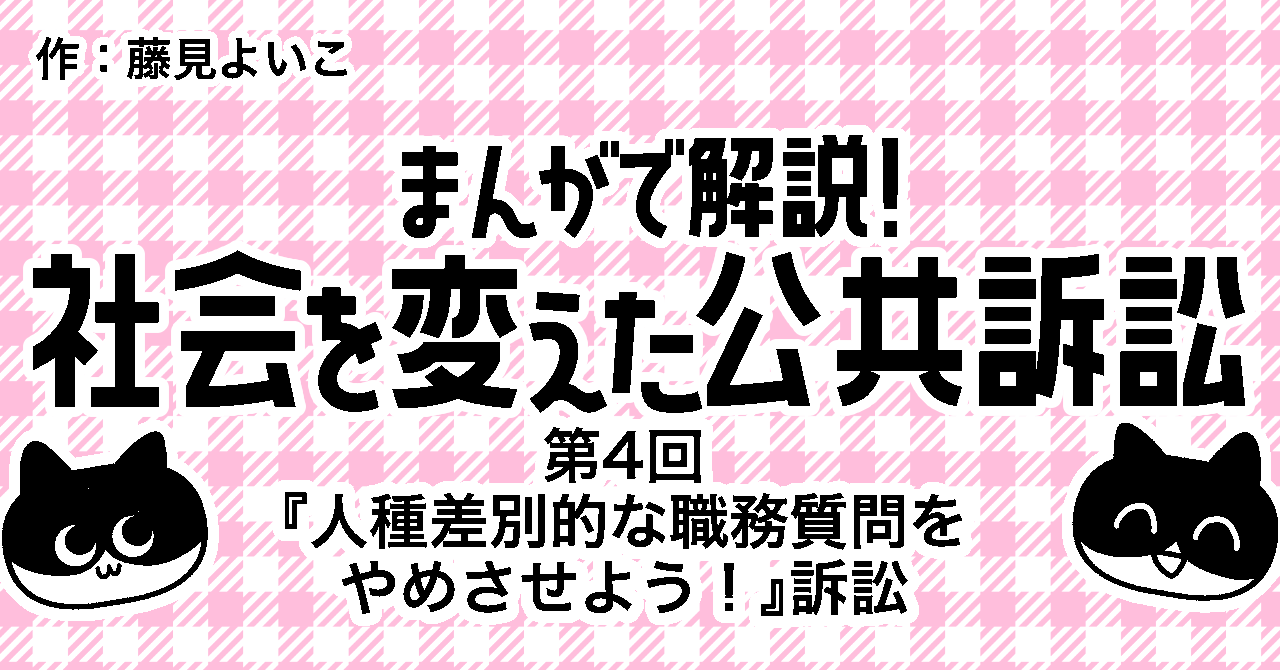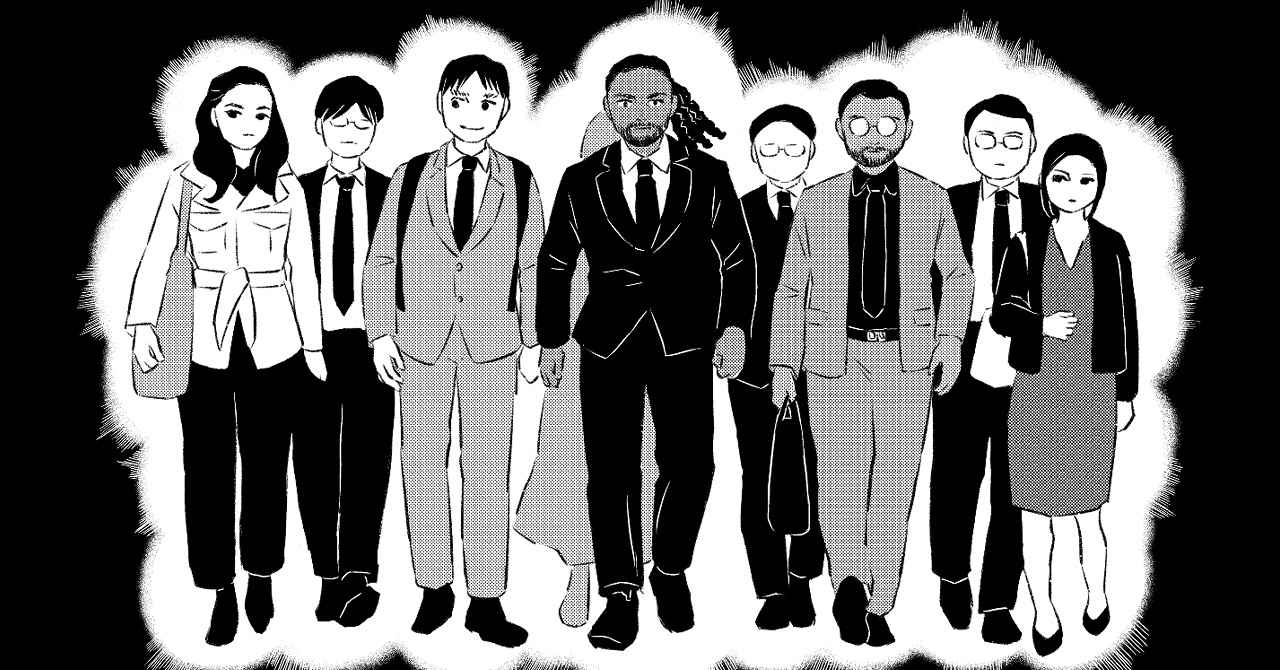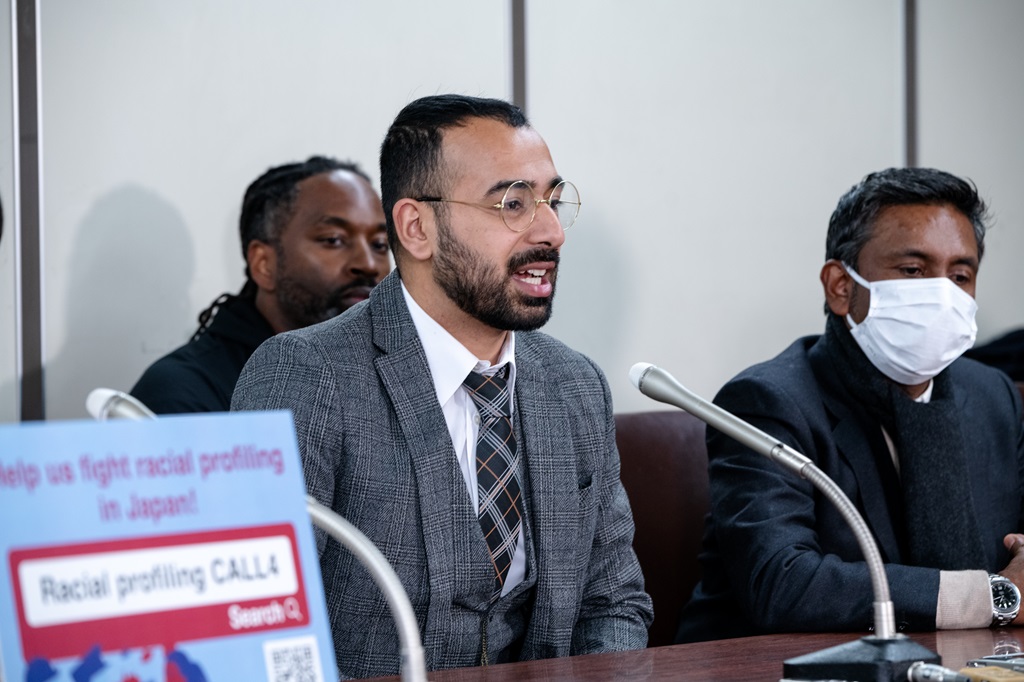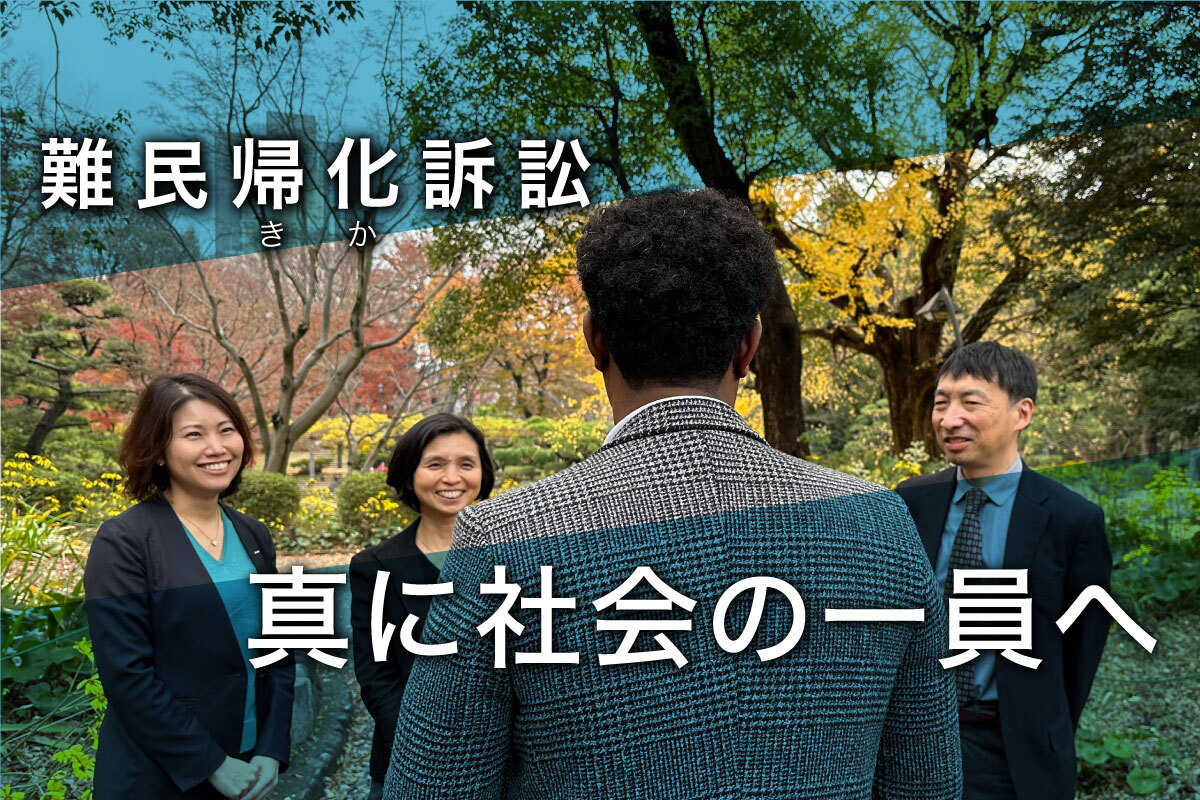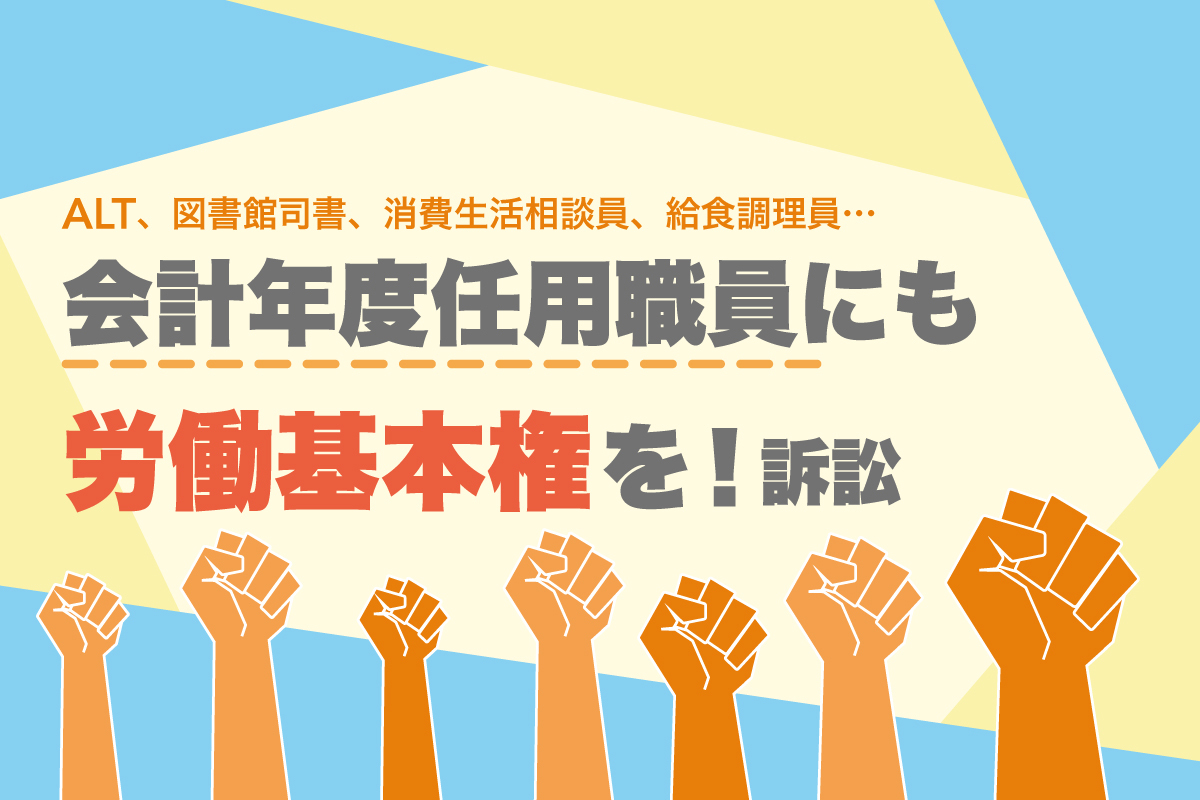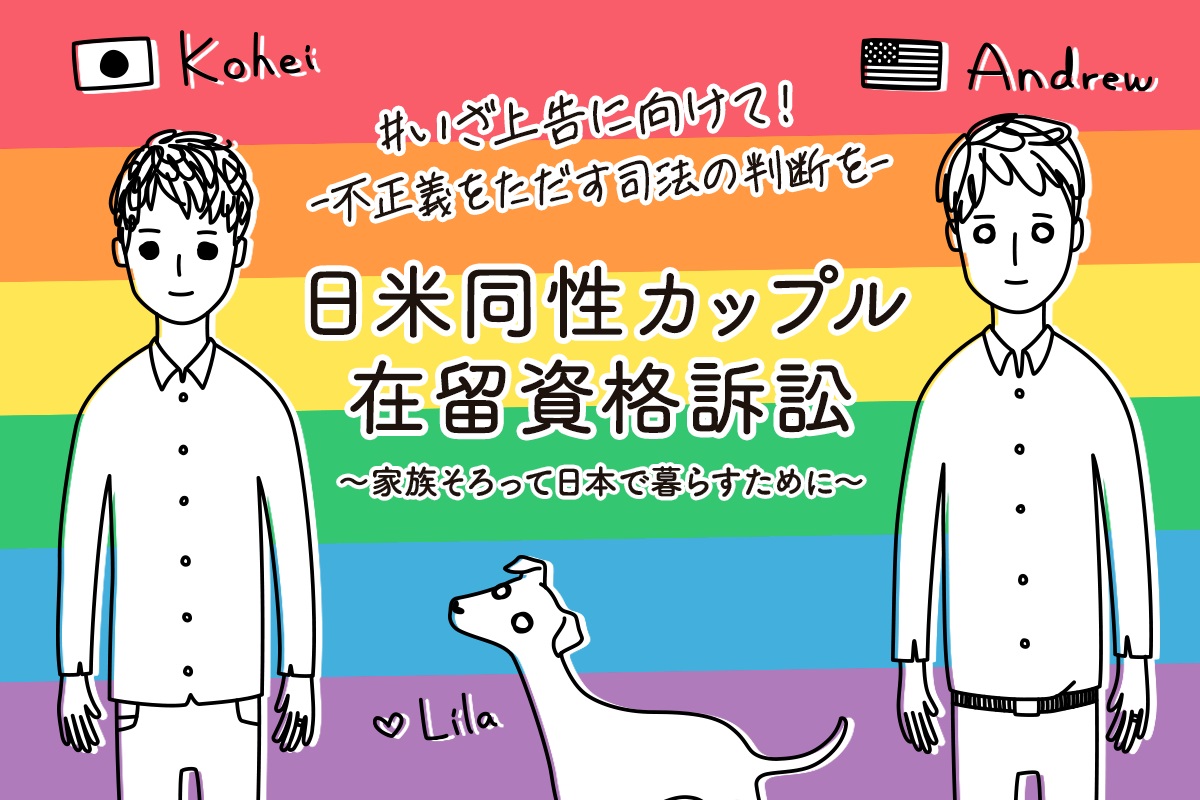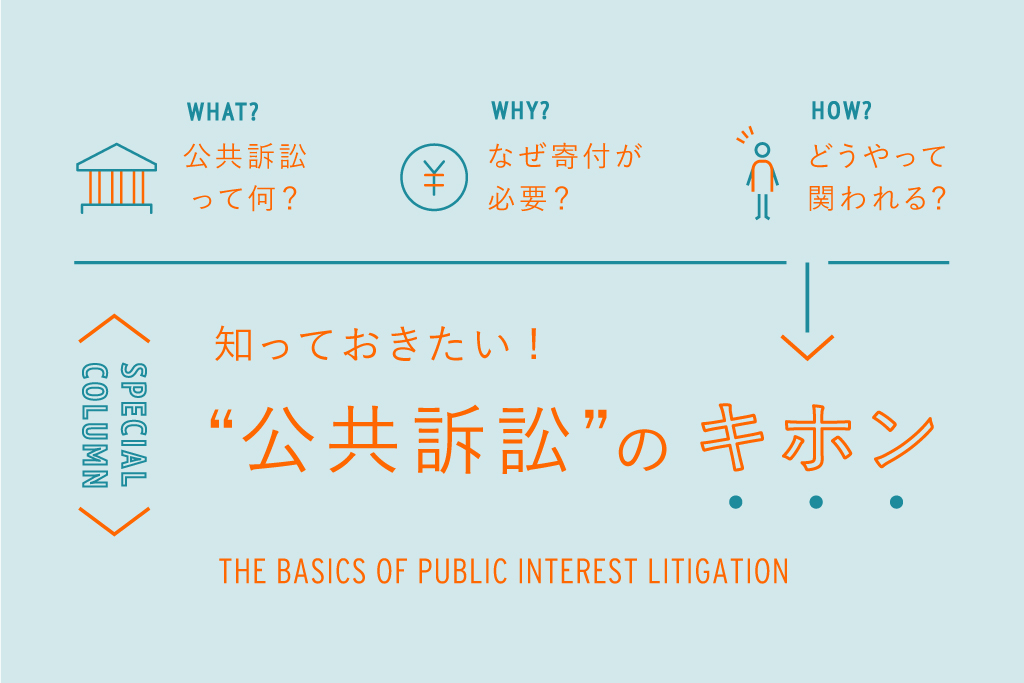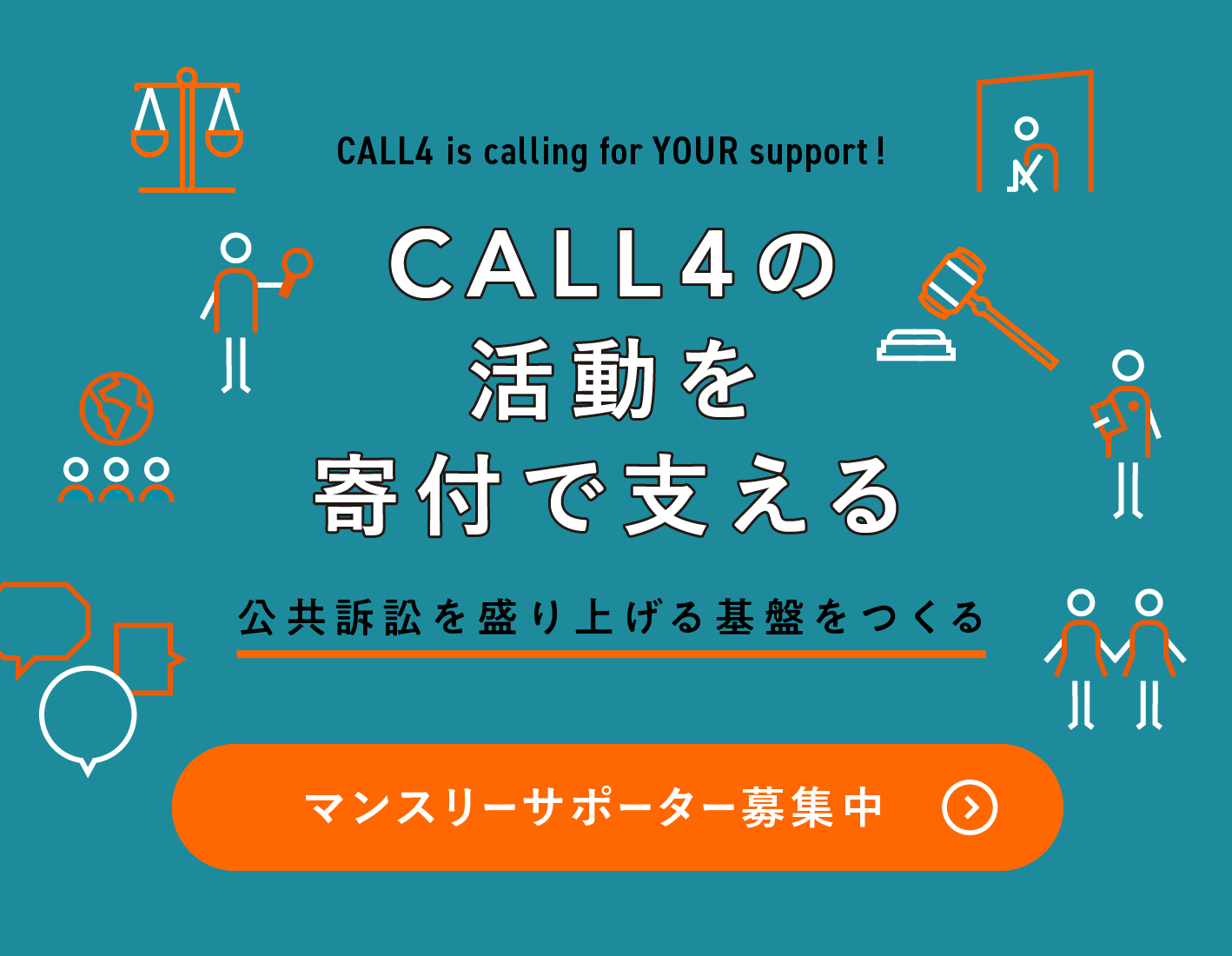人種差別的な職務質問をやめさせよう!訴訟|#STOPレイシャルプロファイリング Lawsuit to End Racially Discriminatory Police Questioning|#STOPRacialProfiling
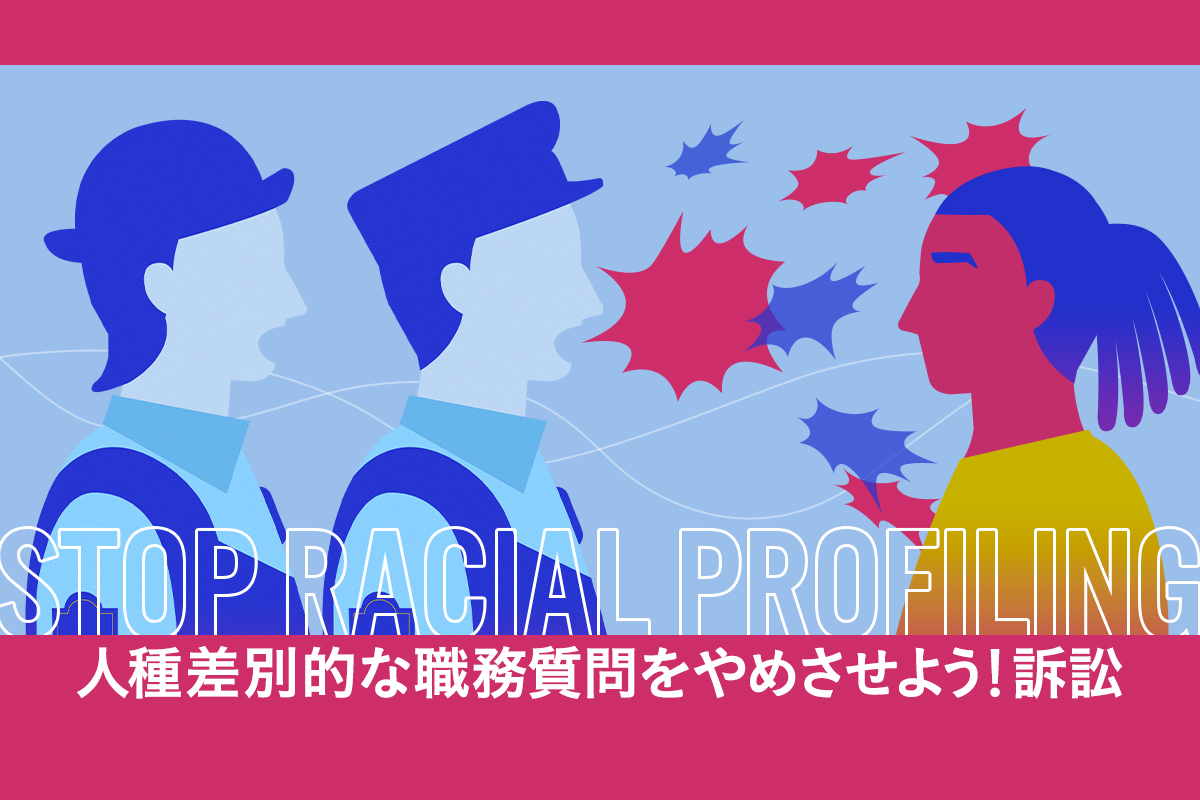
警察が、人種・皮膚の色・民族的出自などを理由に個人を犯罪捜査の対象とするレイシャルプロファイリング。近年、外国にルーツを持つ人たちから、不審事由がないにもかかわらず繰り返し職務質問をされるという被害を訴える声が後を絶ちません。私たちは、職務質問のレイシャルプロファイリング的運用が憲法や国際条約等に違反したものであることを訴え、このような運用をなくさせたいと考えています。 The police practice of racial profiling, where individuals are targeted for criminal investigation based on factors such as race, skin color, or ethnic origin, rather than objective evidence or individual behavior, has become a persistent issue. In recent years, there have been continuous complaints from people of foreign roots who have been subjected to repeated police questioning despite the absence of any reasonable suspicion. The systemic practice or racially discriminatory police questioning violates the Constitution and international conventions. This practice must come to an end.
はじめに
警察官による職務質問は、警察官職務執行法が定める「不審事由(※)」が認められる場合に限り認められています。しかし、これだけ国際化が進んでいるにも関わらず、外国ルーツの見た目を持つ場合には、不審事由がなくても警察官から人種差別的な職務質問をされたと訴える声が後を絶ちません。
歩いているだけで1日に何度も職務質問を受ける、見た目が大人になった中学生の頃からずっと受け続けている、警察官を見ると怖くて震える、といった声も寄せられています。一人の警察官にとっては気にも留めない一度の職務質問だったとしても、それは当事者に大きなショックを与えます。ましてや人生においてその被害が度重なることによって、「自分はこの国にいてはならない存在である」とさえ感じてしまうようになるのです。この訴訟の原告の一人は、いわれのない職務質問をされ続けた結果、元来は社交的な性格であったのに、次第に笑顔が失われ、人が変わったように家に引きこもるようになってしまったといいます。
見た目が「外国人」又は「外国ルーツを持つ人」という理由に基づいて、警察官から犯罪者又は犯罪者予備軍として扱われることは、人間の尊厳を損なう重大な人権侵害です。
私たちは、多様な人たちが暮らす社会のあり方としてふさわしくない人種差別的な運用の改廃を求めて、国や、都警察や県警察を所管する都道府県を相手に提訴することにしました。
※不審事由とは
「何らかの犯罪を犯し、もしくは犯そうとしていると疑うに足りる相当な理由又は既に行われた犯罪について、若しくは犯罪が行われようとしていることについて知つていると認められる者」を言います。「不審事由」があるかどうかは、動作や態度等が不自然かなどまわりの状況から判断して合理的に判断されます。
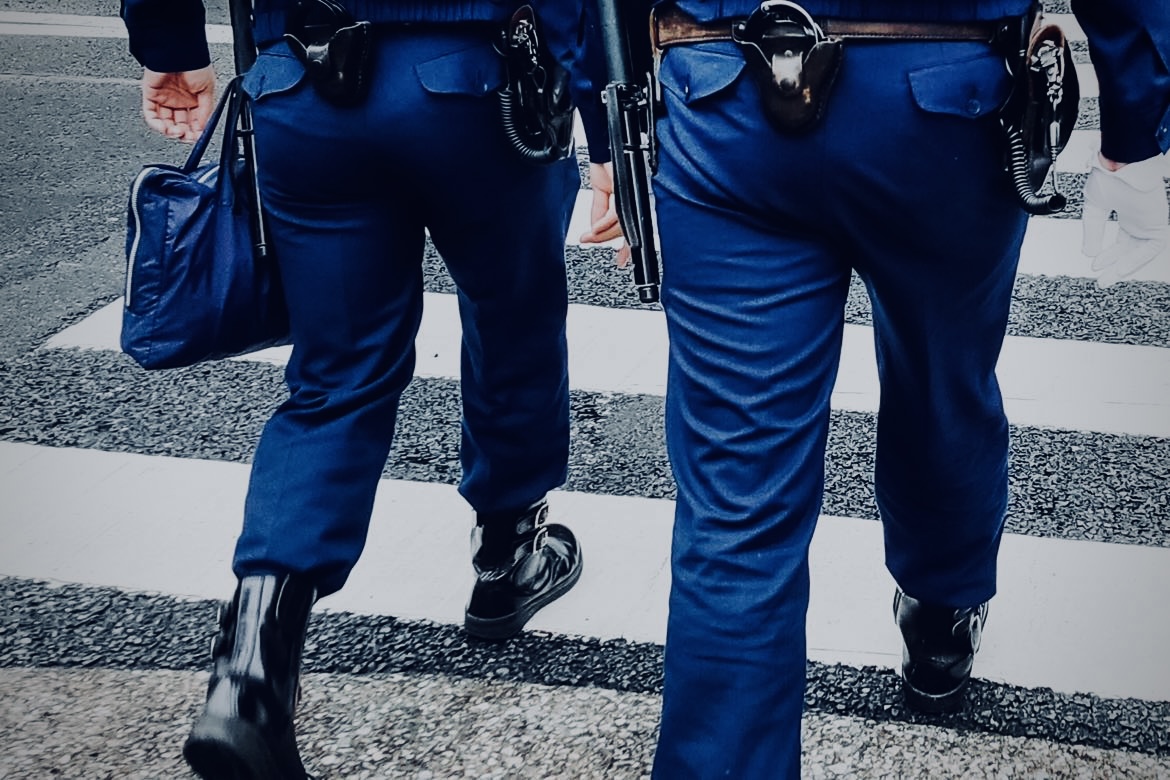
原告が立ち上がった経緯
原告ゼインさん
ゼインさんは、パキスタンで生まれ、8歳の時に来日し、13歳の時に家族とともに日本国籍を取得しました。ゼインさんは日本国籍なので、パスポートを携帯する義務はありませんし、在留カードはそもそも持っていません。ところが、ゼインさんは「外国人風」という外見を理由に、職務質問をたくさん受けてきました。
2023年4月と、2023年9月、ゼインさんは自宅から外に出た際、警察官から職務質問をされました。ゼインさんは、日本国籍であることを伝えましたが、警察官はこれに納得せず、在留カードやパスポートの提示を求め、ゼインさんは所持品検査を受けました。
ゼインさんはこうした職務質問をこれまで15回程度受けており、1日のうちに2回職務質問されたこともありました。ゼインさんは、警察官から職務質問をされるたびに自分自身がまるで犯罪者に思われているかのような気持ちになると話しています。
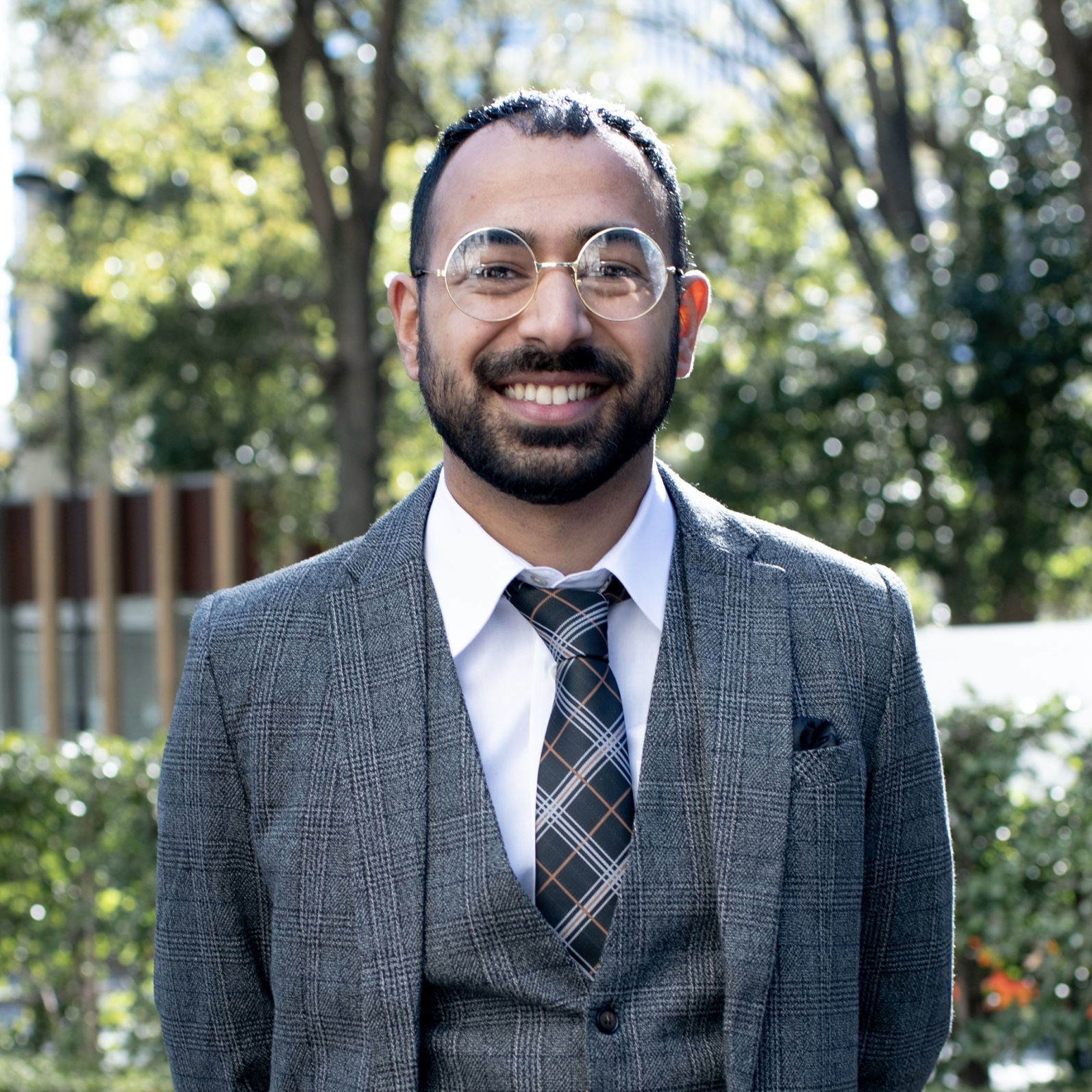
原告シェルトンさん
シェルトンさんは、アフリカ系アメリカ人です。髪はドレッドヘアーという編み方をしています。シェルトンさんは日本に10年近く居住しており、永住者の在留資格を有し、日本国籍の家族とともに暮らしています。
2021年4月、シェルトンさんが自宅からバイクで出かけたところ、何らの交通違反がないにもかかわらず、2人組の警察官に呼び止められました。警察官は、運転免許証だけでなく、在留カードの提示を求め、「何の仕事をしているのか」など運転とは関係のないことを質問しました。シェルトンさんが職務質問の様子をスマートフォンで撮影し始めると、警察官は職務質問をやめてシェルトンさんを解放しました。警察官が、運転とは関係のない在留カードの提示を求めたことや、質問内容から、シェルトンさんが外国人に見えることを理由に職務質問をしていたことは明らかでした。
シェルトンさんは、日本で暮らす約10年の間、このようないわれのない職務質問を16-17回程度受けてきたといいます。
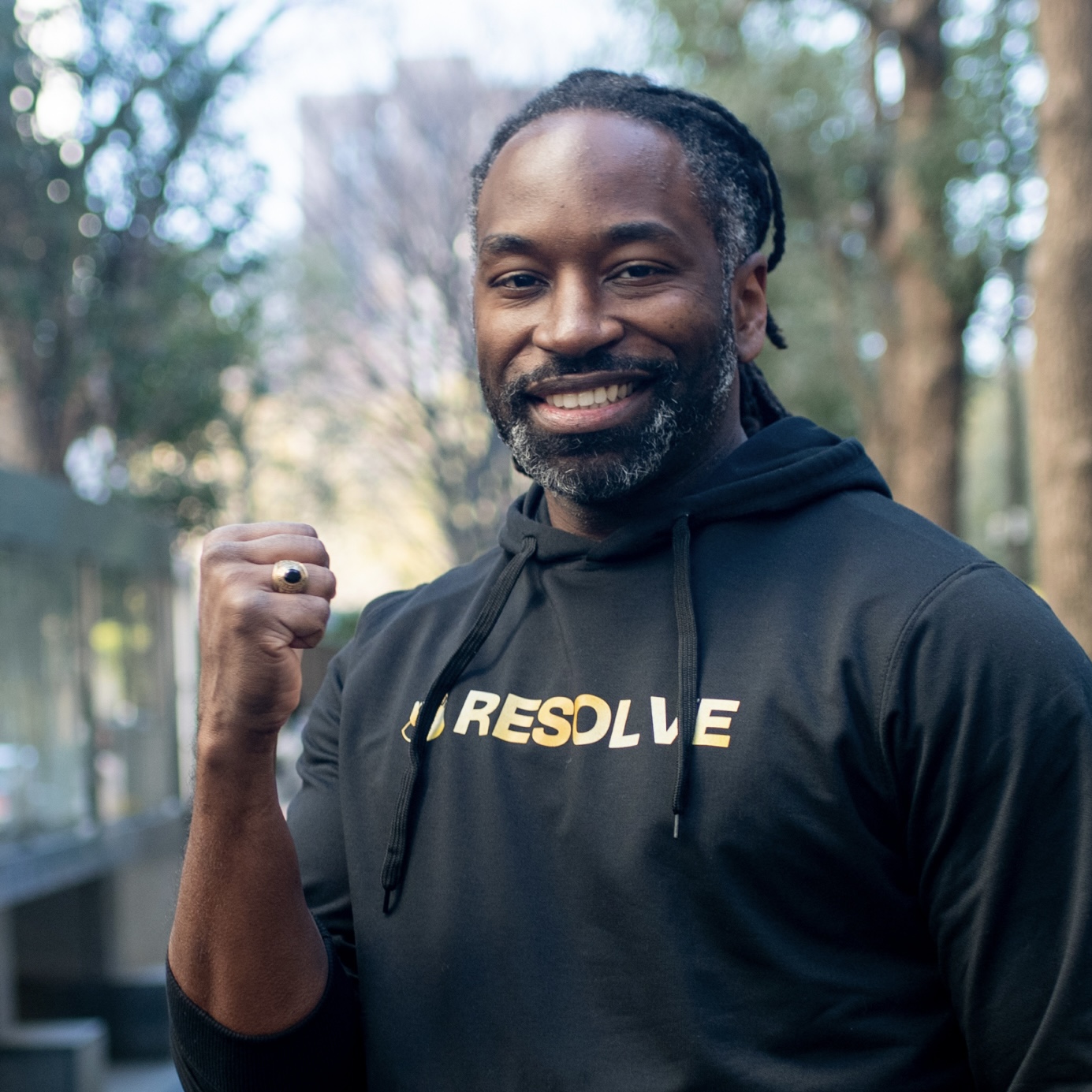
原告マシューさん
マシューさんは、南太平洋諸島の国で生まれ、いくつかの国での居住を経て日本に移住。永住者の在留資格を取得し、日本国籍の妻と暮らしています。
2021年10月、マシューさんは妻を助手席に乗せて自家用車を運転していました。すると交差点ですれ違ったパトカーが、Uターンをして追いかけてきて、サイレンを鳴らしながらマイクで停止を指示してきました。パトカーとすれ違った際、マシューさんの妻は、ダッシュボードの中を探していたので、外からはマシューさんが一人で車を運転しているように見える状況でした。
路肩に停車すると、警察官が運転免許証の提示を求めてきました。マシューさんの妻が「交通違反をしましたか」と聞くと、警察官は「いえ」と答え、「この辺りで外国の方が運転しているのは珍しいですから」と答えました。
マシューさんは来日以来、自宅前や職場のそばの路上、駅などにおいて、大小合わせると100回近く職務質問を受けており、1日2回の職務質問に遭ったことも4度あるといいます。
「自分が体験したことは氷山の一角に過ぎない」と話すマシューさんは、自分のためだけでなく、レイシャルプロファイリングに苦しむすべての人のために今回原告になることを決意しました。
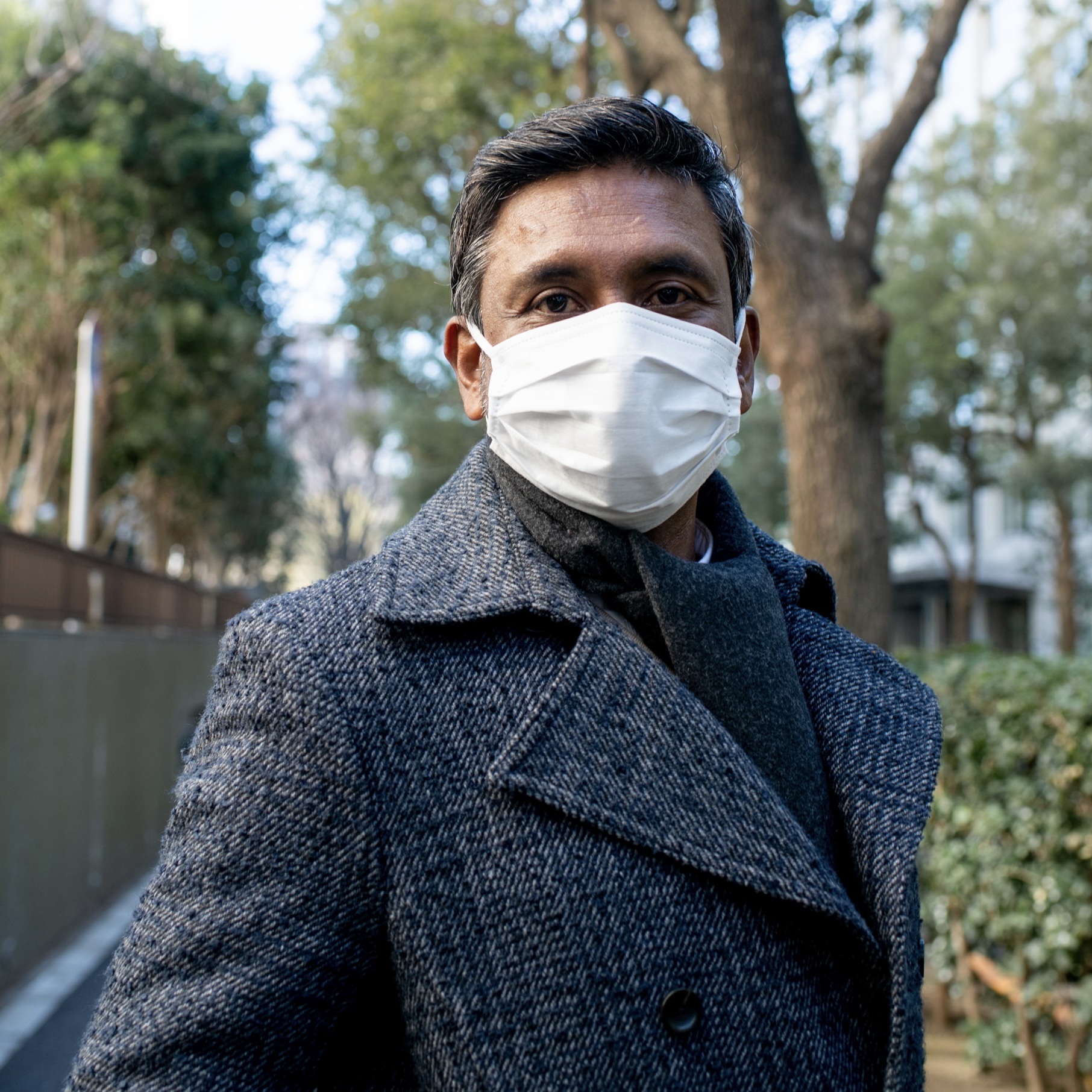
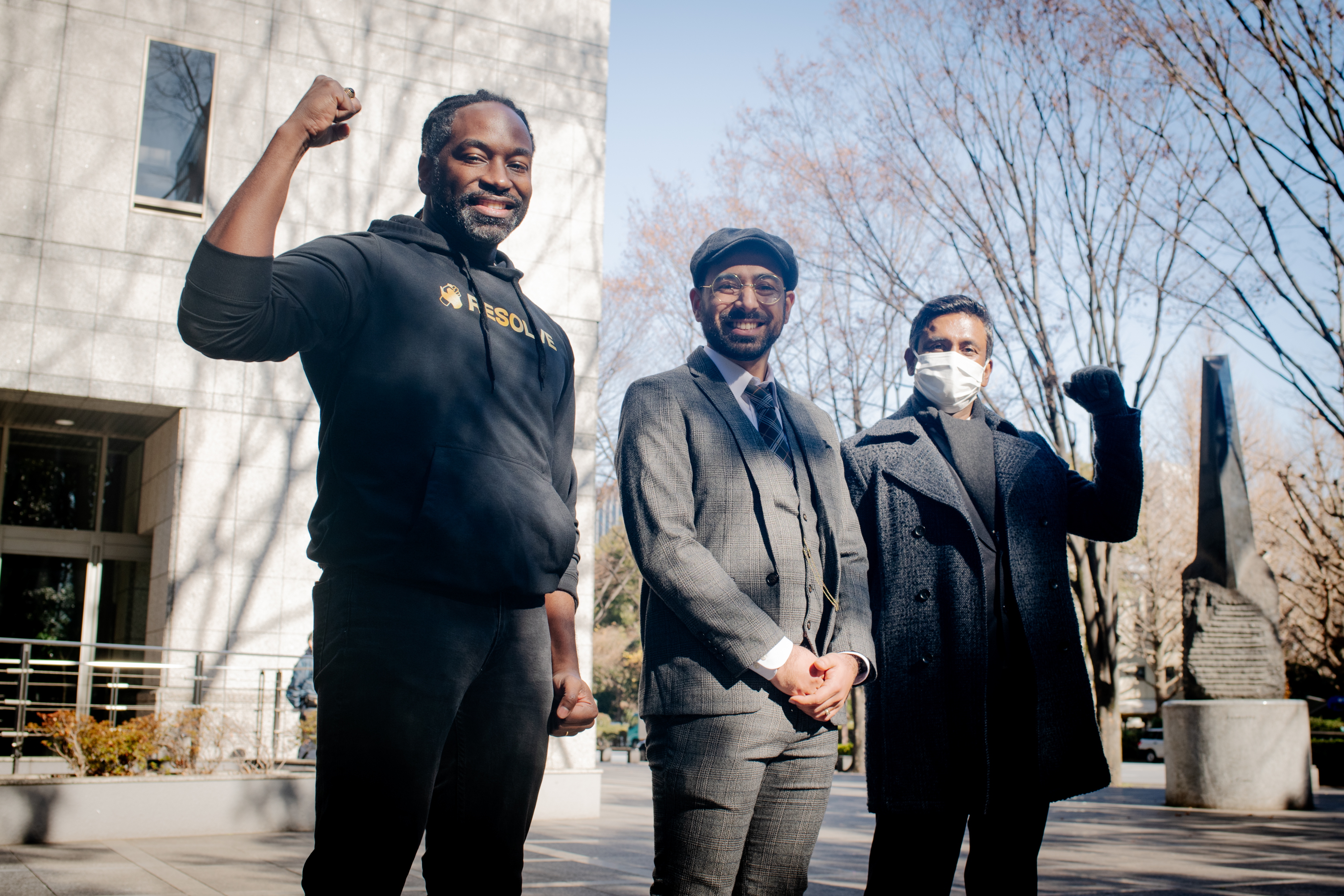
裁判に至る経緯
日本でレイシャルプロファイリングという言葉が注目を浴びるようになったのは2021年のことです。この年の1月、東京駅構内で「ドレッドヘアーは薬物を持つ人が多い」という理由で職務質問がなされたという動画がSNS上で流れたことがきっかけでした。6月にはムスリムの母子に対して警察官が不当な聴取を行った「ムスリム母子不当聴取事件」が起こり、12月にはアメリカ大使館が「レイシャル・プロファイリング事案が発生している」とツイッターで警告を出しました。
その後の調査でも、レイシャルプロファイリングを受けた外国ルーツの人たちが大勢いることが分かっています。
2022年に東京弁護士会が行った「2021年度外国にルーツをもつ人に対する職務質問(レイシャルプロファイリング)に関するアンケート調査」(有効回収数2094件)によると、過去5年間に職務質問を受けたことがある人は62.9%にのぼります。このうち85.4%が警察官に外国ルーツだと認識されたと答えており、76.9%が不審事由はなかったと認識していたことが分かっています。「外国人だと分かった途端に態度や言葉遣いが横柄になった」「日本国籍だと分かった途端に態度が丁寧になった」「ヘアスタイルやファッションが怪しいと言われた」といった声が数多く寄せられています。
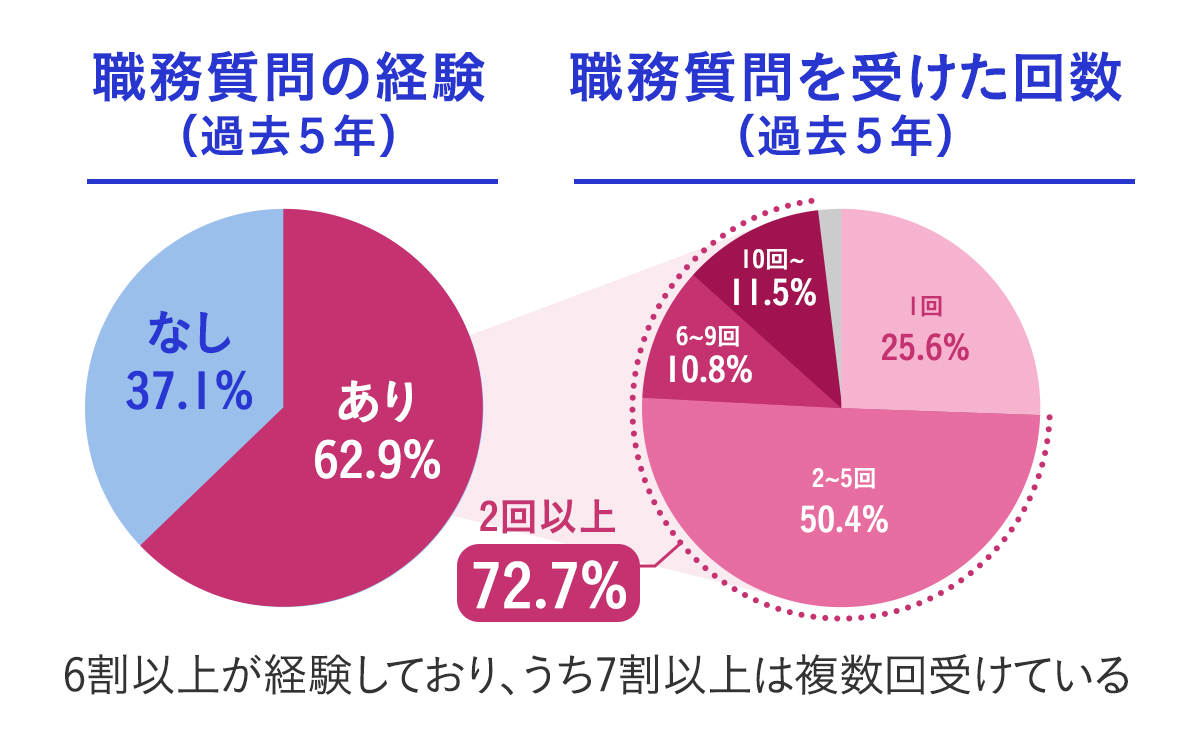
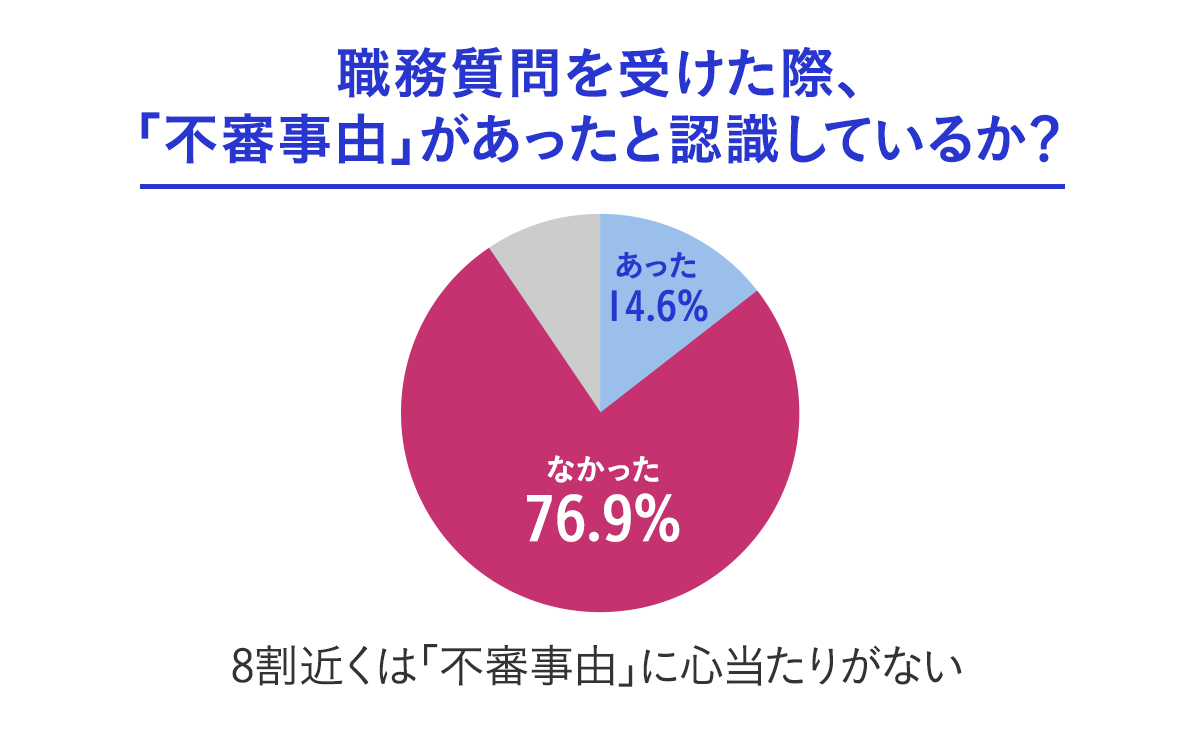
警察官の中には、外国ルーツの人たちが頻繁に職務質問を受ける理由として外国人犯罪率の高さを挙げる人もいるようです。しかし、このことを裏付ける客観的な資料は存在しません。
あるジャーナリストが令和3年版犯罪白書(法務省法務総合研究所編)等を分析した結果によれば、国内の外国人(※)と日本人の犯罪率の間に有意な差はないことが分かっています。2020年の刑法犯の検挙人数18万2582人のうち外国人は9529人でした。2020年の日本人の人口推計は1億2335万2000人で国内に滞在する・居住する外国人は633万6391人であることからすると、国内の外国人と日本人の犯罪率は0.15%で同じであるとされています。
※「日本国籍を持たない者」を指す。警察庁の統計では、「永住権を有する者やその配偶者、在日米軍関係者と在留資格不明者以外の外国人」を「その他の外国人」とし、この「その他の外国人」以外の外国人を「来日外国人」として、その両方のカテゴリーを合わせて「外国人」としている。ここで比較対象としている「外国人」の範囲も、警察庁の統計に合わせたものである。
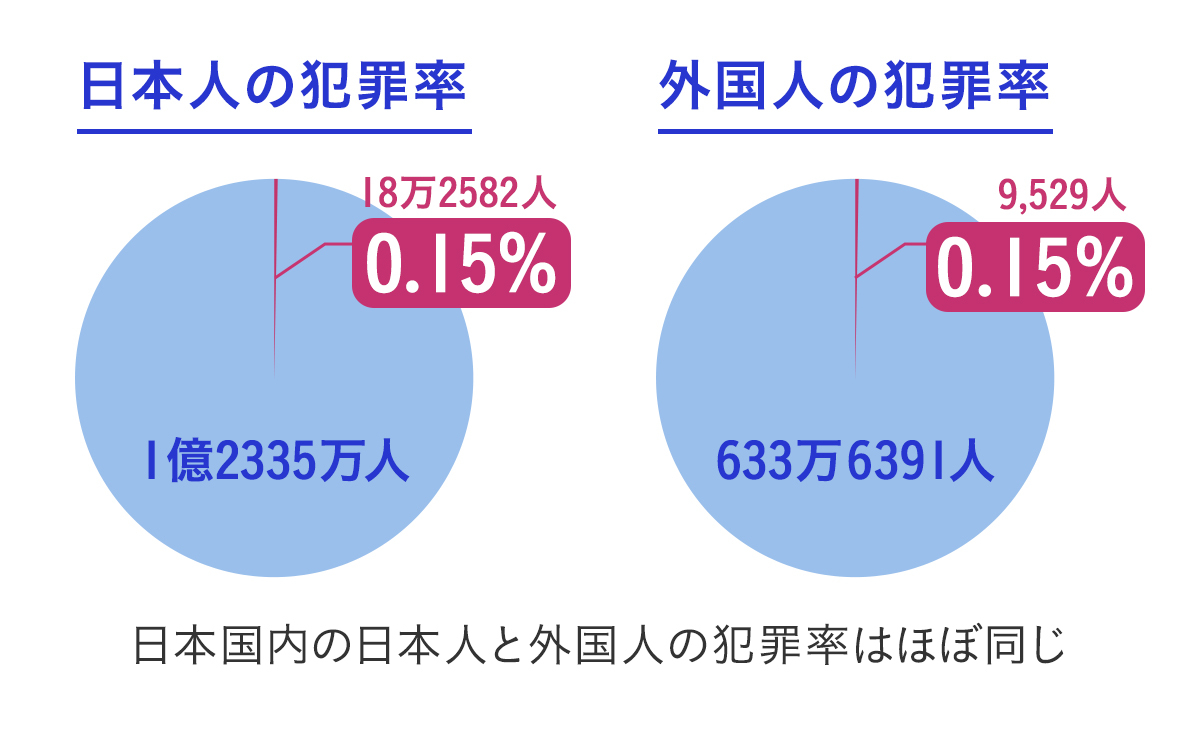
(出典:國﨑万智「取材から見えた、日本のレイシャルプロファイリング現在地」宮下 萌(編)『レイシャル・プロファイリング 警察による人種差別を問う』2023年・大月書店)
国際社会ではさらに以前からレイシャルプロファイリングの問題が指摘されてきました。2009年に国連自由権規約委員会はレイシャルプロファイリングが不当な差別に当たると宣言し、2020年11月には国連人種差別撤廃委員会が「法執行官によるレイシャル・プロファイリングの予防と根絶」と題した勧告を採択しました。
しかし、日本には人種差別を禁止する法律がなく、レイシャルプロファイリングを防止するための法律やガイドライン等も存在せず、立法に向けた動きも見られませんでした。
レイシャルプロファイリングを奨励するような警察の内部ルールを示唆するような文献もあります。例えば、愛知県警が若手警察官に配布した現場対応マニュアルには次のように記載されています。
「外国人は入管法、薬物事犯、銃刀法等 何でもあり!!」
「一見して外国人と判明し、日本語を話さない者は、旅券不携帯、不法在留・不法残留、薬物所持・使用、けん銃・刀剣・ナイフ携帯等必ず何らかの不法行為があるとの固い信念を持ち、徹底的した追及、所持品検査を行う。」
警察内部にこのような運用があり続けるのも、日本では長年この問題が野放しにされてきた結果と言えます。
本訴訟の争点
私たちは警察による職務質問についてのレイシャルプロファイリングの運用(以下「本件運用」)が違憲・違法であると考え、国や都道府県に対して、以下3点を請求します。
レイシャルプロファイリングによる差別的な職務質問についての国家賠償請求
レイシャルプロファイリングによる差別的な職務質問運用についての違法確認請求
レイシャルプロファイリングによる差別的な職務質問運用の是正について国の指揮監督義務があることの確認請求
本件運用が違憲・違法と考える根拠は以下です。
1. 憲法違反
憲法14条は法の下の平等について定めており、「人種」による差別を明文で禁止しています。人種、国籍、肌の色等の要素は犯罪傾向を推認するものではありません。そのため、犯罪摘発のために外国人に見えるという外見的要素を考慮することについて合理性はありません。本件運用は、日本で暮らす外国ルーツの人々に日本で暮らしてはいけないかのように感じさせるものであり、差別意識を助長するという弊害をもたらします。
憲法13条後段は「生命、自由及び幸福追求に対する国民の権利については、公共の福祉に反しない限り、立法その他の国政の上で、最大の尊重を必要とする。」と定めていますが、上記のとおり外国人のように見えるという外見を理由に行う職務質問には合理性等がなく、この憲法13条にも違反します。
2. 国際条約違反
⑴人種差別撤廃条約
日本はあらゆる形態の人種差別の撤廃に関する国際条約(以下「人種差別撤廃条約」)に加入しており、同条約2条は、国及び公的機関に対し、人種差別をなくすよう求めています。
そして、人種差別撤廃委員会が出した「法執行機関職員による人種プロファイリングの防止及び撲滅に関する一般的勧告第36号(2020年)」にも、「人種プロファイリングは、人種差別的な事件や人種的偏見やステレオタイプを助長し、永続させる可能性のある行為であるため本条約の理念に反している。したがって、締約国は、人種プロファイリングが行われず、促進されないようにするために、政策、法律及び規制を見直す義務がある。締約国は、法律、政策及び制度を通じて差別を撤廃するための措置を積極的に講じる義務がある。」と明記されています。
⑵自由権規約違反
日本は市民的及び政治的権利に関する国際規約(以下「自由権規約」)を批准しています。
自由権規約26条は「すべての者は、法律の前に平等であり、いかなる差別もなしに法律による平等の保護を受ける権利を有する。このため、法律は、あらゆる差別を禁止し及び人種、皮膚の色、性、言語、宗教、政治的意見その他の意見、国民的若しくは社会的出身、財産、出生又は他の地位等のいかなる理由による差別に対しても平等のかつ効果的な保護をすべての者に保障する」と定めており、レイシャルプロファイリングは、人種、国籍及び皮膚の色による差別に他ならず、同条に違反します。
寄付のお願い
レイシャルプロファイリングは、これを受けた者に対して日本にいてはならないというスティグマを植え付け、人間としての尊厳を深く傷つける行為です。とりわけ、レイシャル・プロファイリングは、公権力による意図的な人種差別という意味において、差別の中でも最も悪質な差別の一つです。
今回の裁判をとおして、レイシャルプロファイリングについて日本の社会全体で議論し、警察の運用に変化をもたらすことを期待します。日本に住む外国ルーツの人たちが安心して暮らせる社会を実現するために、どうかご支援のほどよろしくお願いいたします。
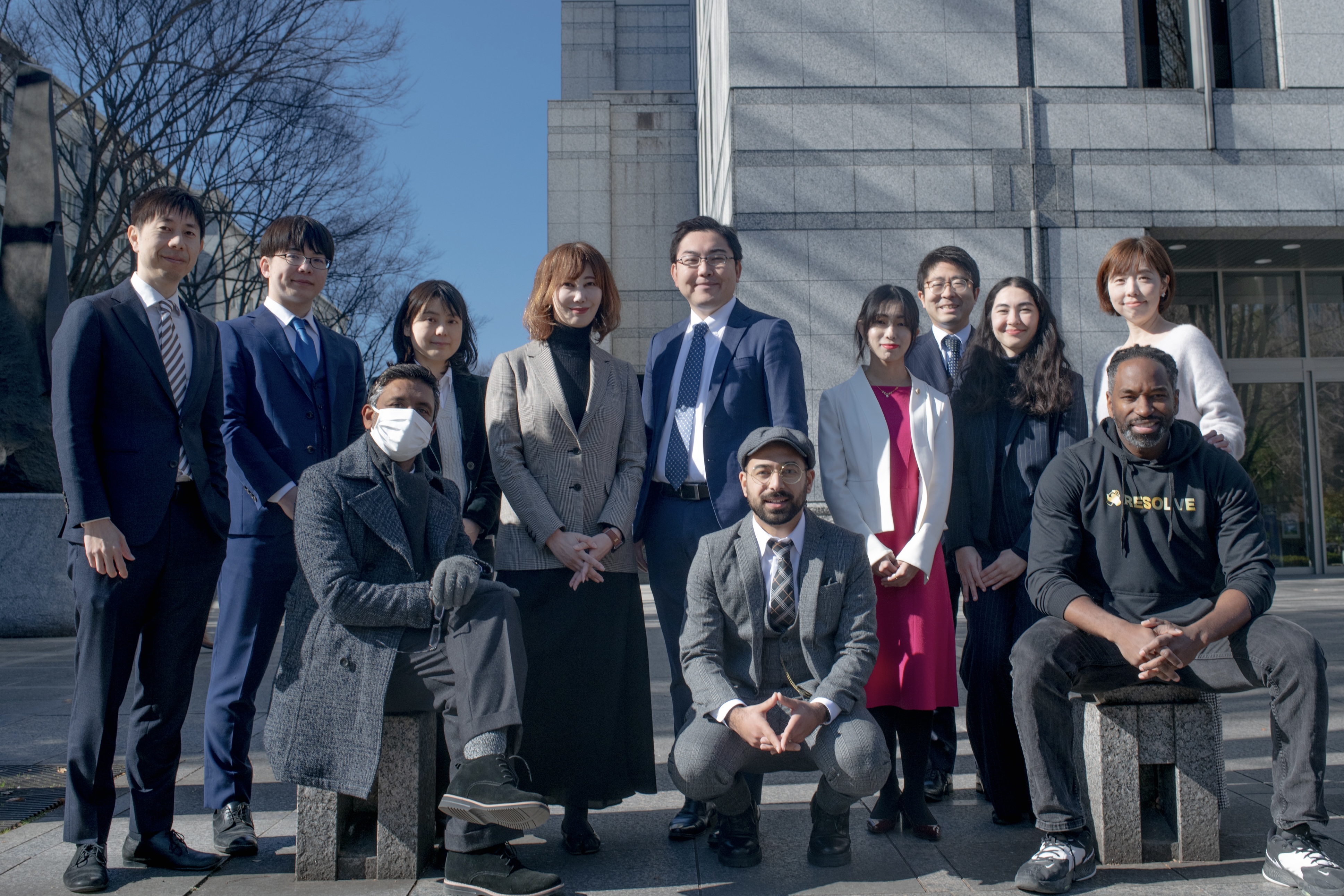
資金の使途
訴訟費用:印紙代・コピー代などの実費費用
学者に依頼する意見書費用:専門的な分野ですので、憲法学者や行政法学者等の専門家に意見書を執筆していただくことを予定しています
海外の知見の証拠化:海外の専門家などからヒアリングをしたり、意見書を提出していただくことを検討しています。これには通常の謝礼の他翻訳費用も必要となります
弁護団、原告などの交通費:原告や弁護団の一部が裁判に出頭する際の交通費、専門家の方などに東京にお越しいただく際の交通費を寄付金から支出する予定です
イベント開催・広報費用:この裁判に関するイベントや広報費用にも寄付金を用いたいと考えています
弁護士費用:弁護団員の着手金、成功報酬、出張日当等に活用したいと考えています
弁護団について
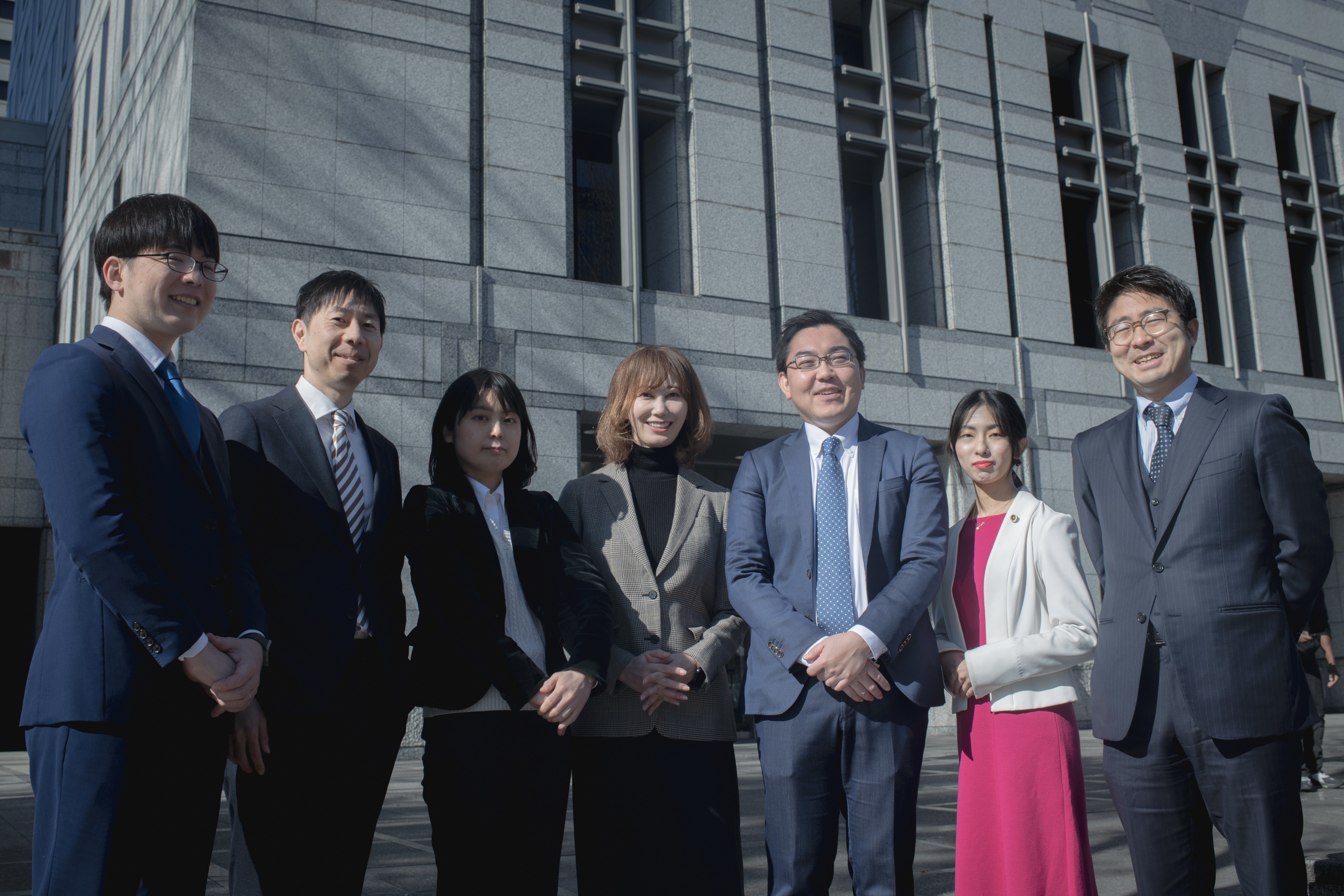
谷口太規(弁護士法人東京パブリック法律事務所)
浦城知子(信和法律事務所)
宮下 萌(弁護士法人戸野・田並・小佐田法律事務所東京オフィス)
西 愛礼(後藤・しんゆう法律事務所)
亀石倫子(法律事務所エクラうめだ)
井桁大介(宮村・井桁法律事務所)
戸田善恭(法律事務所LEDGE)
弁護団からのメッセージ
本来は市民の安全を「守る」はずの警察官が、「外国人」又は「外国人風の見た目である」ということを理由とし、何も怪しいことをしていないのにその人を「監視」の対象とする―—このような社会を許して良いのでしょうか?
レイシャルプロファイリングに遭った多くの方々からお話を伺うと、いかに警察官という公権力からの差別が、苦痛や恐怖、悔しさをもたらすか……いかに人間の尊厳を損なうものか、そして、いかに変えなければならない問題なのかが分かるかと思います。
三権の一つである「司法」、つまり裁判によって「レイシャルプロファイリングという問題があり、是正の必要がある」というメッセージを伝えることは、非常に大きなインパクトがあり、「社会を変え、世の中を動かす」ということに繋がると私達弁護団は信じています。
是非多くの方に、この「レイシャルプロファイリング」という問題を変えていく力を貸して頂ければと思います。
一緒に差別を許さない社会を作って行きましょう。
弁護士 宮下 萌
LEDGEについて
LEDGEは、特定の公共訴訟を支えるために作られた、各種専門家によるチームです。本訴訟はLEDGEの支援を受けています。(本訴訟の弁護団の一部はLEDGEのメンバーです。)
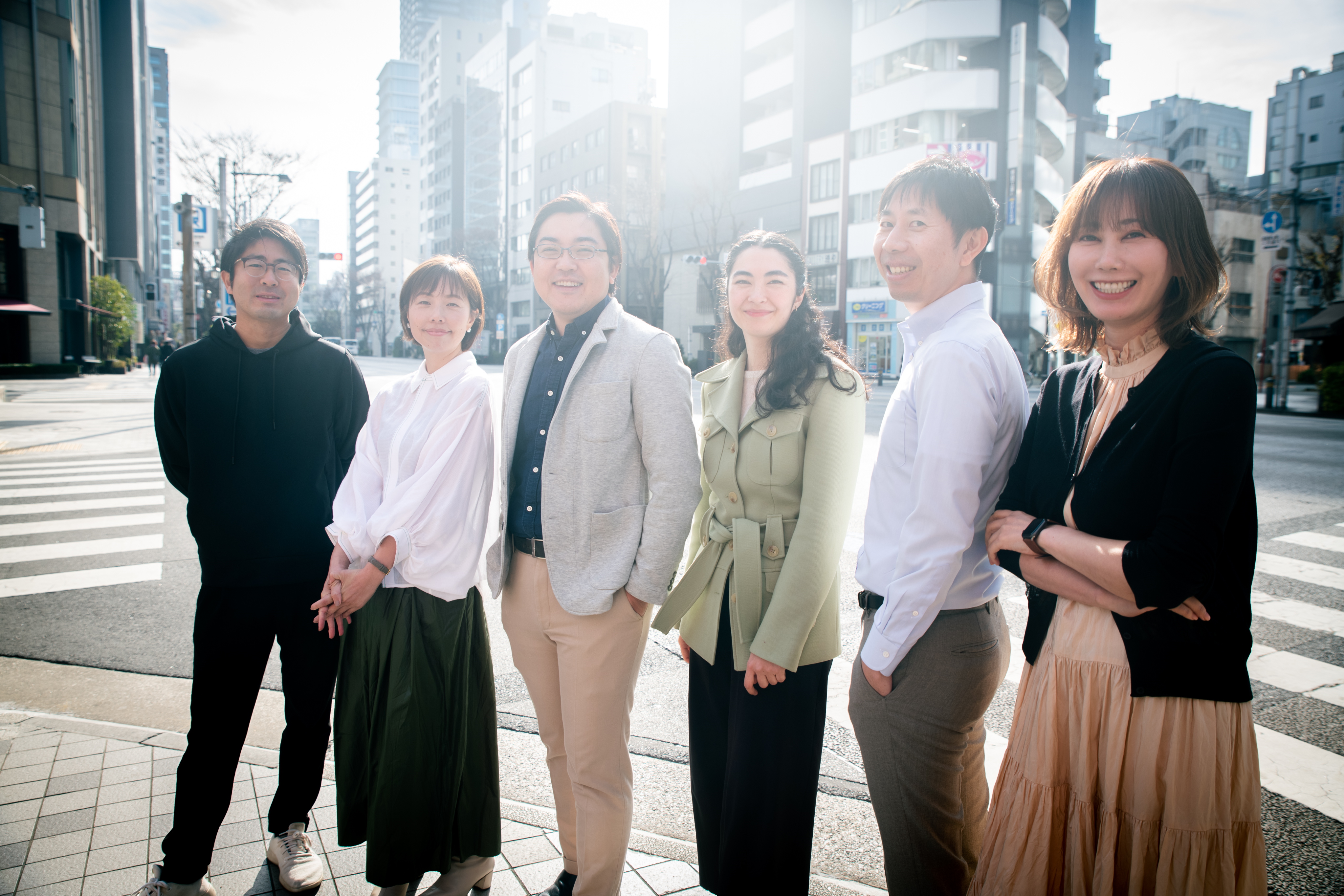
(左から)井桁大介、丸山央里絵、戸田善恭、池田クラリス、谷口太規、亀石倫子
ご支援の方法
1. 寄付をする
・ご寄付はオレンジのボタン「支援する」から。ご支援をどうぞよろしくお願いします!
2. 署名をする
・Change.orgにて、署名キャンペーンも実施中です。
-「人種差別的な職務質問の改善を求めます #STOPレイシャルプロファイリング」
3. SNSでつながる
・「#STOPレイシャルプロファイリング」SNSにて関連情報を発信中です。ぜひフォローください。
Introduction
Under the Police Duties Execution Law, police questioning is permitted only when there is "sufficient probable cause(*)". However, despite the internationalization of Japanese society, there have still been a large number of complaints from people “with a foreign appearance” who have experienced racially discriminatory police questioning even in the absence of sufficient probable cause.
Some people say that they have been questioned by the police several times a day just for walking, that they were subjected to police questioning ever since they were in junior high school, or that they get scared and start shaking when they see a police officer. Racial profiling has a human cost. When a person is confronted to racial profiling over and over in their lifetime, this can lead to a profound sense of not belonging to Japanese society. One of the plaintiffs in this case, who used to be a sociable person, gradually lost his smile and started to live as a shut-in as a result of repeated encounters with police questioning.
Being treated as a criminal or a potential criminal by police officers merely because one appears “foreign” is a serious violation of human rights and undermines human dignity.
We have decided to file a lawsuit against the government and the prefectures that have jurisdiction over metropolitan and prefectural police departments, demanding the abolition of the systemic practice of racially discriminatory police questioning, a practice that we deem inappropriate within our diverse society.
(*) Article 2(1) of the Police Duties Execution Act stipulates that “A police official may stop and question any person for whom there is sufficient probable cause to suspect that the person has committed or is about to commit a crime or who is deemed to possess information on a crime which has already been committed or is about to be committed, judging reasonably on the basis of unusual behavior and/or other surrounding circumstances.”
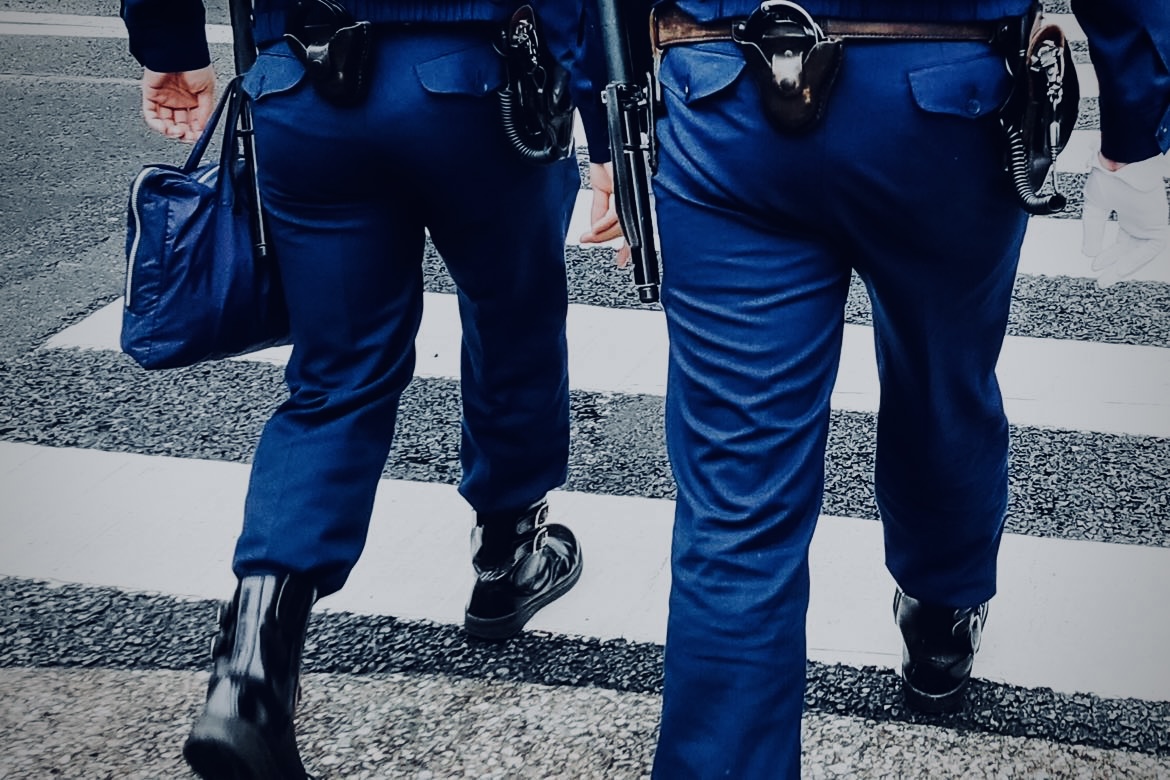
Plaintiffs’ Personal Experiences
Mr. Zain
Mr. Zain was born in Pakistan and came to Japan at the age of 8. He obtained Japanese citizenship with his family at the age of 13. As a Japanese citizen, he is not obliged to carry a passport and does not have a residence card. However, Mr. Zain has been repeatedly questioned by the police on the basis of his "foreign-looking" appearance.
In April and September 2023, he was questioned by a police officer in front of his house. He told the officer that he was a Japanese citizen, but the officer was not convinced. The officer asked him to show his residence card and passport, and then searched his belongings.
Mr. Zain has been subjected to such police questioning about a total of 15 times, sometimes twice a day. He said that every time he is questioned by a police officer, he feels as if he is a criminal.
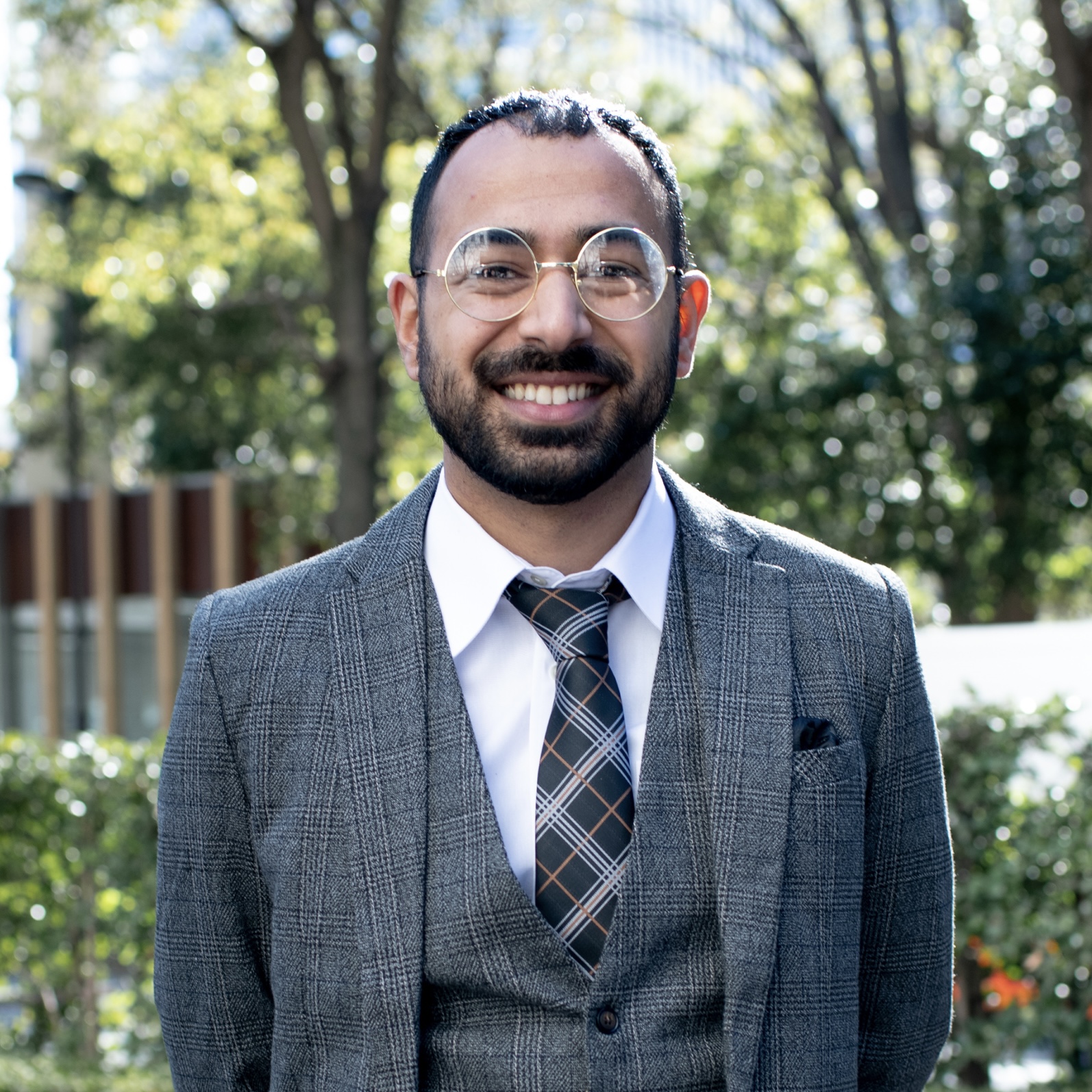
Mr. Shelton
Mr. Shelton is an African-American man who wears dreadlocks. He has been living in Japan for nearly 10 years, has permanent resident status, and lives with his family members who are Japanese citizens.
In April 2021, as he was driving his motorcycle in full respect of traffic rules, he was ordered to stop and was questioned by two police officers. The police officers asked him to present his driver's license as well as his residence card and asked him questions unrelated to driving, such as "What do you do for a living?” When Mr. Shelton started filming with his smartphone, the police stopped questioning him and subsequently released him. It appears clear that the police officers asked him to show his residence card, which had nothing to do with driving, and questioned him due to his “foreign appearance.”
Over the last 10 years he has been living in Japan, Mr. Shelton has experienced police questioning about 16-17 times.
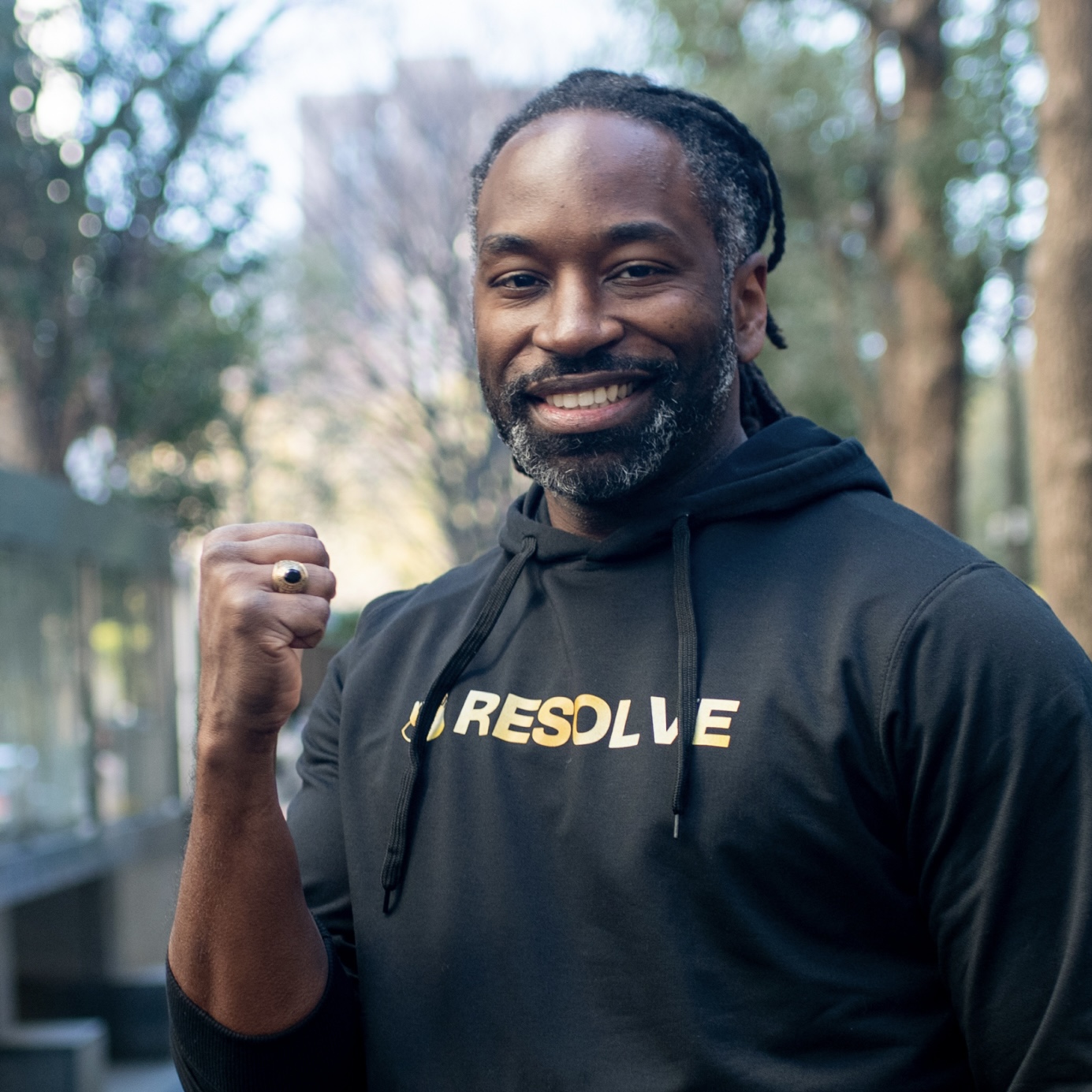
Mr. Matthew
Mr. Matthew is a Pacific Islander and lived in several countries before moving to Japan. He became a permanent resident and is currently living in Japan with his Japanese wife.
In October 2021, a police patrol car that passed him while he was driving made a U-turn and ordered him to stop over the microphone with its siren blaring. When the police car passed by, as his wife was searching through the dashboard, it appeared from the outside that he was driving the car alone. He stopped on the shoulder of the road, and the police officer asked for his driver's license. When Matthew's wife, who was a passenger in the car, asked if he had committed any traffic violation, the officer replied, "No”, “It’s rare to see a foreigner driving in this area.”
Since his arrival in Japan, Mr. Matthew has been questioned about 100 times by the police in Japan - in front of his home, in the streets near his workplace, at train stations - including four times when he was questioned twice a day. “What I have experienced is just the tip of the iceberg," he said. He decided to become a plaintiff for the sake of all those who suffer from racial profiling.
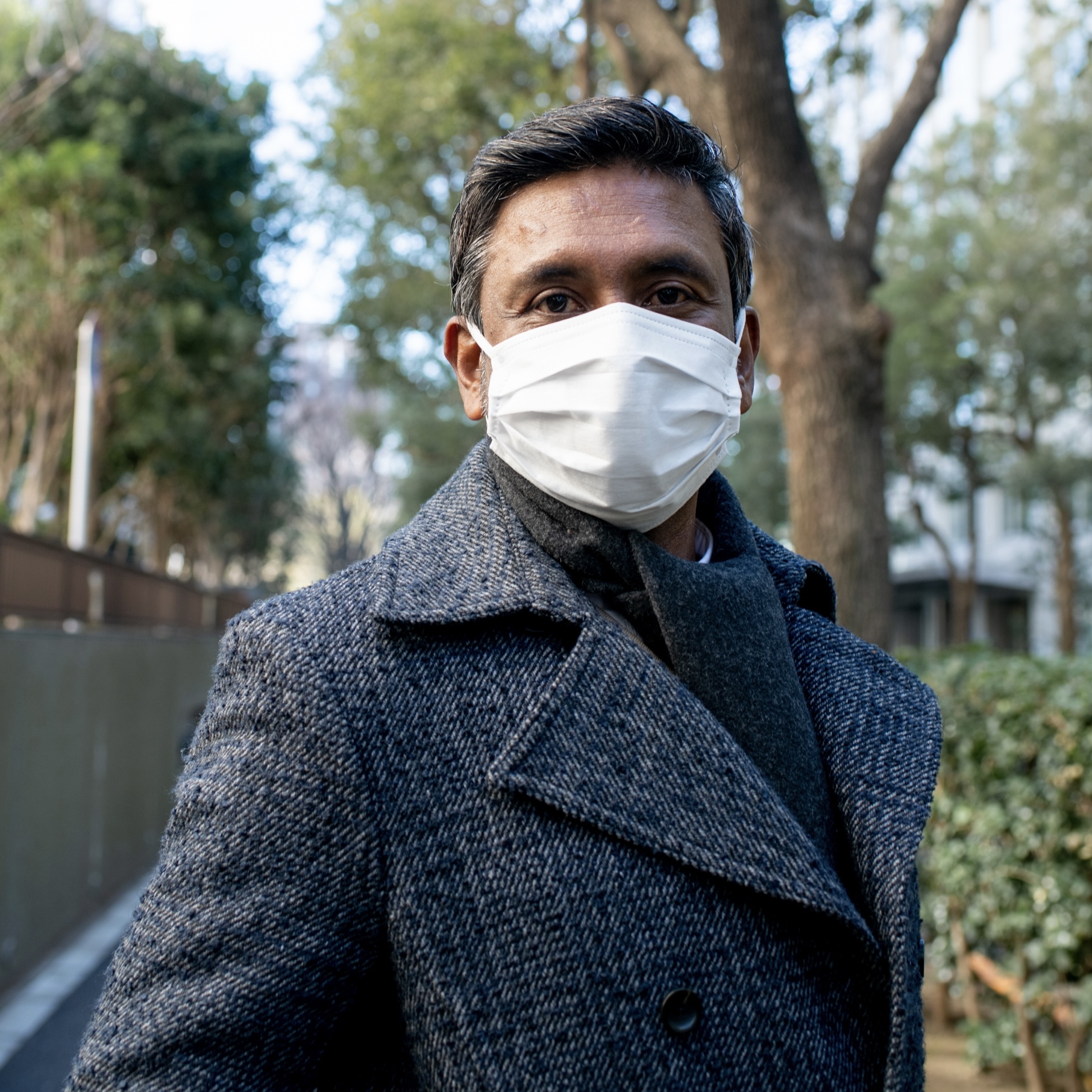
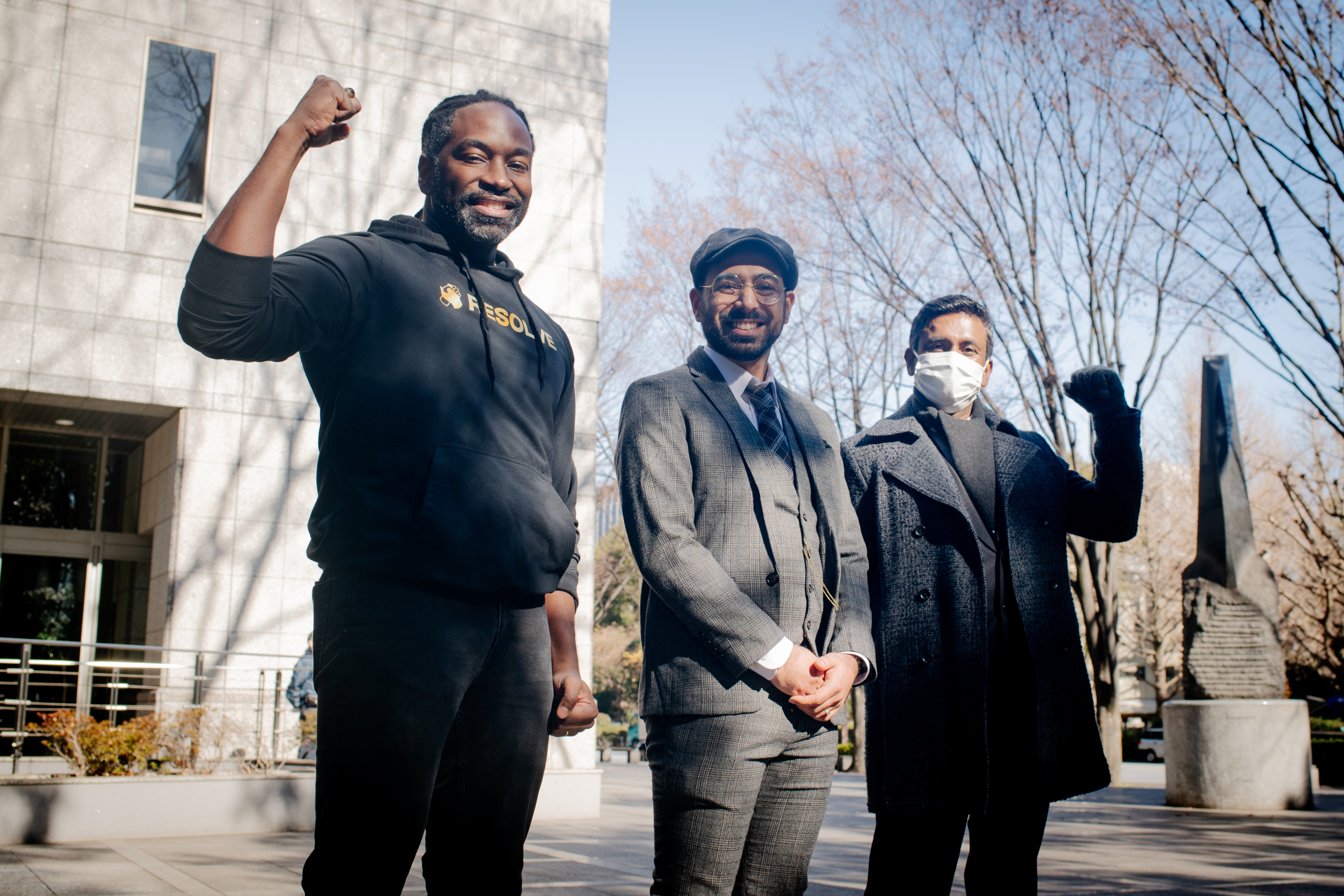
Background of the Lawsuit
The term “racial profiling” first came to attention in Japan in 2021. In January of that year, a video of a man who was subjected to racial profiling on the grounds that "many people with dreadlocks are drug users" went viral on social media. In June, a Muslim mother and her child were unfairly questioned by police officers and in December, the U.S. Embassy issued a tweet warning U.S. citizens against suspected incidents of racial profiling by the Japanese police.
Subsequent investigations have also revealed that there are many people of foreign descent who have been subjected to racial profiling.
According to the "2021 Survey on Police Questioning of People with Foreign Roots (Racial Profiling)” conducted by the Tokyo Bar Association in 2022 (2,094 respondents), 62.9% of respondents had been questioned by the police in the past five years. Out of these, 85.4% replied that the police officers perceived them as having foreign origins, and 76.9% said that there was no sufficient probable cause to suspect that they committed or were about to commit a crime. Some respondents declared: "as soon as they found out I was a foreigner, their attitude and language became arrogant," "as soon as they found out I was a Japanese citizen, their attitude became polite," and "they said my hairstyle and clothing were suspicious."
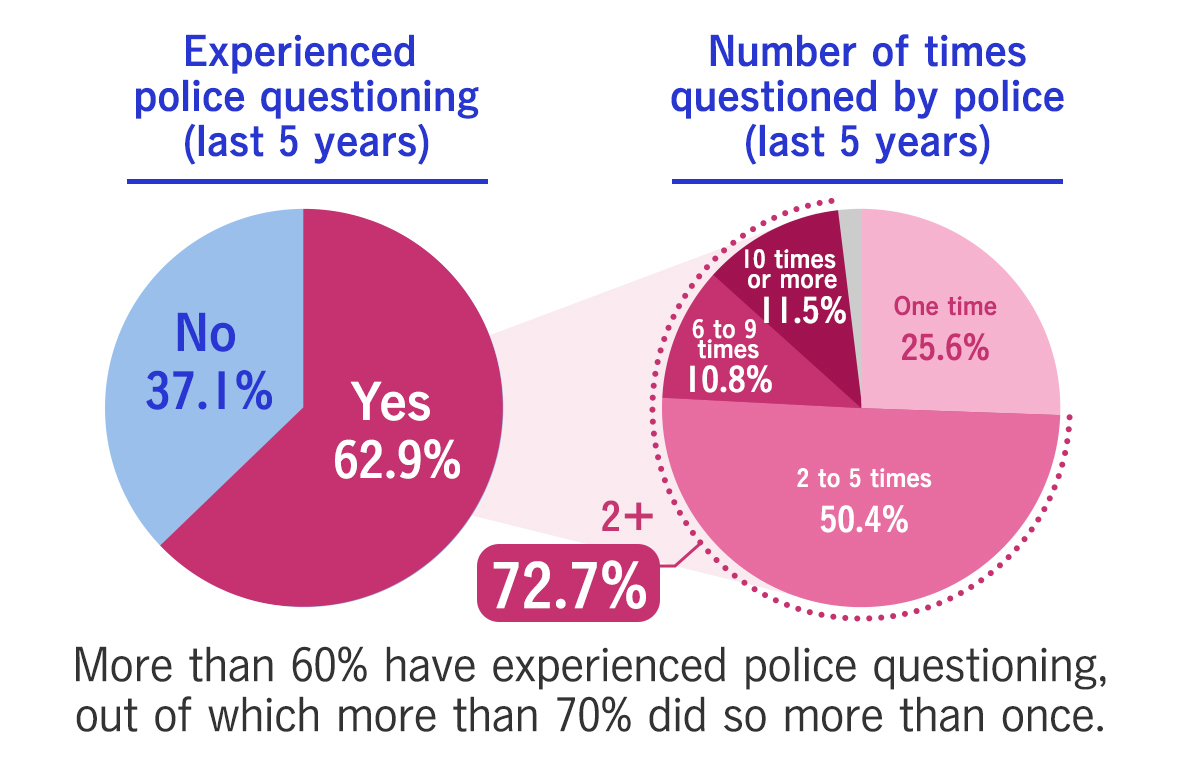
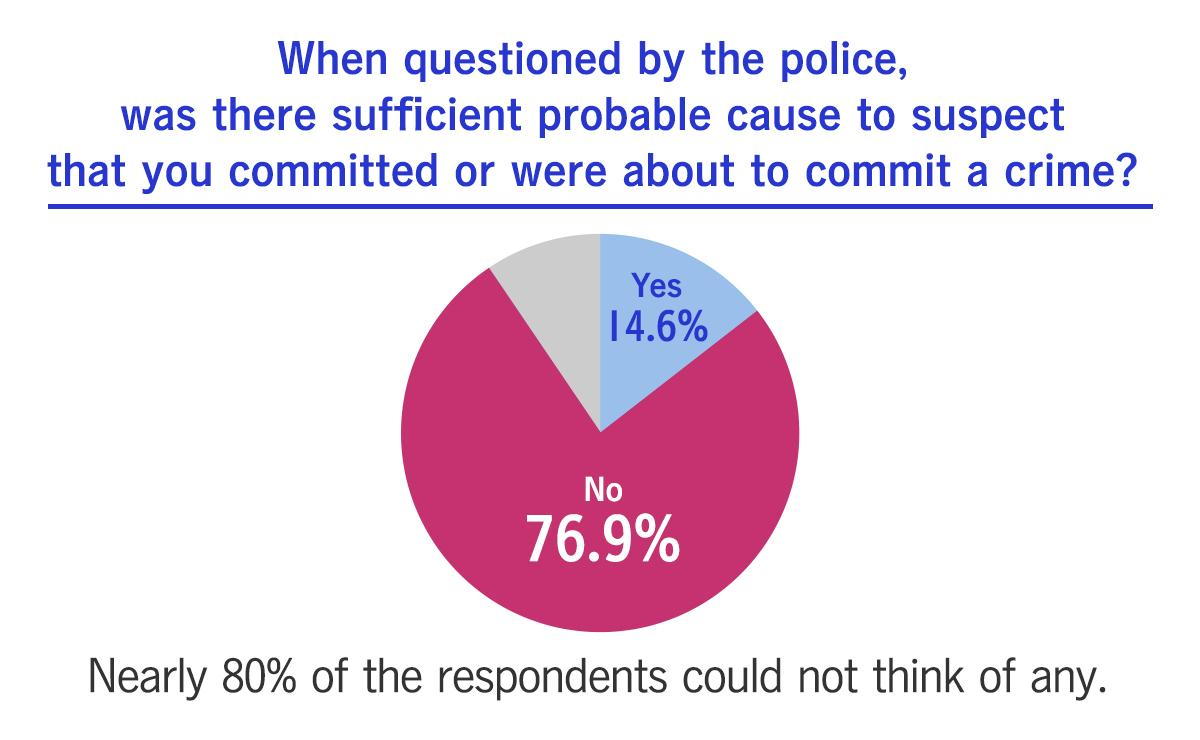
Some police officers claim that they frequently question people of foreign origin due to the “high crime rate” of foreigners. However, there is no objective data to support such a claim.
According to a journalist's analysis of the 2021 White Paper on Crime (edited by the Ministry of Justice Research and Training Institute) and other resources, there is no significant difference between the crime rates of foreigners and Japanese (Machi Kunizaki, 「取材から見えた、日本のレイシャルプロファイリング現在地」"Interviews reveal the reality of racial profiling in Japan today," in Moe Miyashita (ed.) レイシャル・プロファイリング 警察による人種差別を問う Racial Profiling: Questioning Racial Discrimination by the Police, 2023, Ōtsuki Shoten).
"Foreigners" refers to “those who do not have Japanese nationality. In the National Police Agency's statistics, “foreigners other than permanent residents, their spouses, U.S. military personnel in Japan, and those whose status of residence is unknown” are defined as “other foreigners,” and foreigners other than these “other foreigners” are defined as “foreigners coming to Japan,” with both categories combined as “foreigners. The scope of “foreigners” used here is also based on the National Police Agency's statistics.
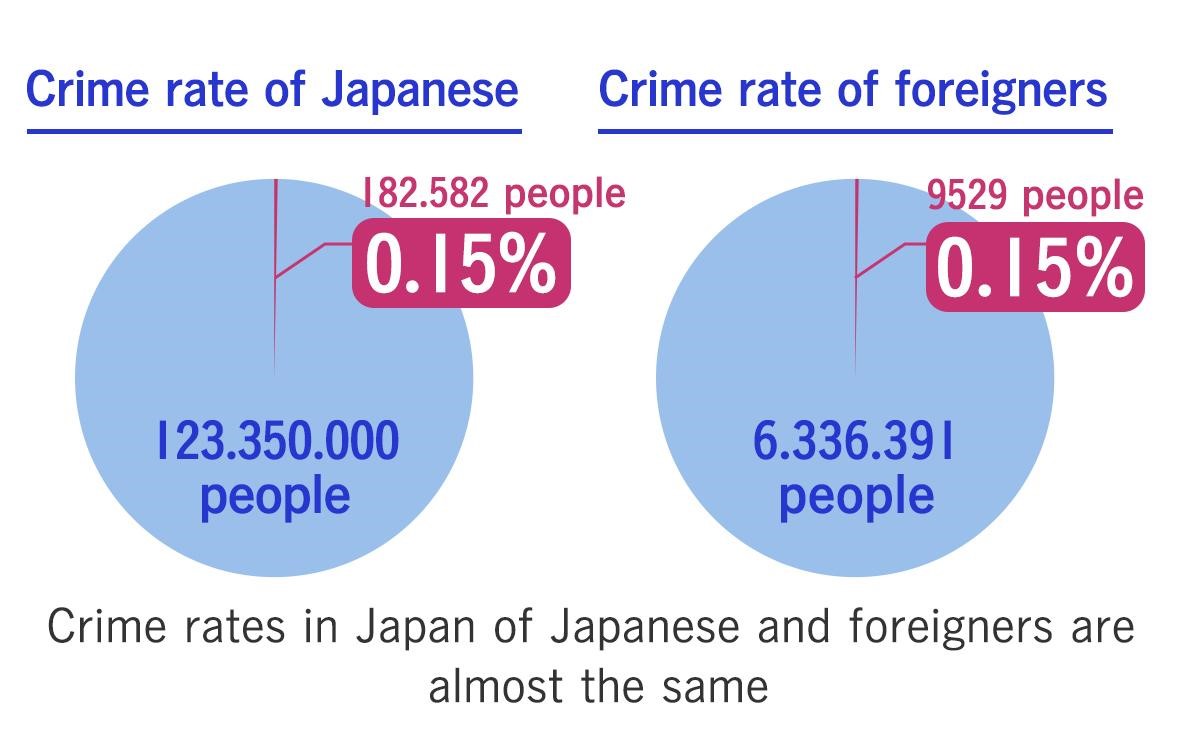
Racial profiling has come under scrutiny of the international community since longer. In 2009, the UN Human Rights Committee declared that racial profiling constitutes unlawful discrimination, and in November 2020, the UN Committee on the Elimination of Racial Discrimination adopted General Comment No.36 on preventing and combating racial profiling by law enforcement officials.
Against this backdrop, Japan does not have any anti-discrimination law, nor any laws or guidelines aimed at preventing racial profiling. To date, we have yet to see any willingness to legislate in this regard.
Some internal police guidelines even encourage racial profiling. For instance, a field training manual of the Aichi Prefectural Police for junior police officers states the following:
“For foreigners - use the Immigration Control Act, drug offenses, the Firearms Control Act, etc. Anything works!!”
“For those who appear to be foreigners at first glance and those who do not speak Japanese, firmly believe that they have, without exception, committed some sort of illegal act - not carrying their passport, illegal residence or overstay, possession/use of drugs, carrying a gun, sword, or knife, etc. - and conduct thorough investigation and search of personal belongings.”
The reality of this kind of systemic practice within the police ranks results from the fact that this problem has been left unchecked in Japan for many years.
Points in Dispute
We claim that the practice of racially discriminatory police questioning is unconstitutional and illegal and demand the following:
State compensation for racially discriminatory police questioning (racial profiling)
Request for confirmation of illegality regarding systemic practice of racially discriminatory police questioning
Request for confirmation of the State’s obligation to control and supervise police operations for the prevention of racially discriminatory police questioning
The legal basis for such claims are as follows:
1. Violation of the Constitution
Article 14 of the Constitution provides for equality before the law and expressly prohibits
discrimination on the basis of race. Factors such as race, nationality, and skin color are not indicatives of criminal propensity. Therefore, there is no rationality in considering the appearance factor of “looking foreign” for the purpose of crime detection. This systemic practice makes people of foreign origin living in Japan feel as if they are not allowed to live in Japan, and has the harmful effect of generating a sense of discrimination.
In addition, the second sentence of Article 13 of the Constitution stipulates that "Th[e] right [of all of the people] to life, liberty, and the pursuit of happiness shall, to the extent that it does not interfere with the public welfare, be the supreme consideration in legislation and in other governmental affairs.” However, as stated above, questioning someone based on their appearance merely because they “look like a foreigner” is not reasonable and violates Article 13 of the Constitution.
2. Violation of international treaties
⑴ Convention on the Elimination of All Forms of Racial Discrimination
Japan is a signatory to the International Convention on the Elimination of All Forms of Racial
Discrimination ("Convention on the Elimination of All Forms of Racial Discrimination"). Article 2 of the Convention requires the State and public authorities to eliminate racial discrimination. Furthermore, the Committee on the Elimination of Racial Discrimination's General Recommendation No. 36 (2020) on Preventing and Combating Racial Profiling by Law Enforcement Officials also clearly states that: "As racial profiling is a practice that has the potential to promote and perpetuate racist incidents and racial prejudice and stereotypes, it runs counter to the very idea of the Convention. Accordingly, States parties are obliged to review their policies, laws and regulations with a view to ensuring that racial profiling does not take place and is not facilitated. States parties are obliged to actively take steps to eliminate discrimination through laws, policies and institutions.”
⑵ International Covenant on Civil and Political Rights
Japan is a signatory to the International Covenant on Civil and Political Rights ("the Covenant"). Article 26 of the Covenant states that "All persons are equal before the law and are entitled without any discrimination to the equal protection of the law. In this respect, the law shall prohibit any discrimination and guarantee to all persons equal and effective protection against discrimination on any ground such as race, colour, sex, language, religion, political or other opinion, national or social origin, property, birth or other status.” Racial profiling is nothing but discrimination on the basis of race, nationality and color and hence violates the said Article.
Request for Donations
Racial profiling deeply undermines human dignity, stigmatizing those who are subjected to it and suggesting that they don’t belong in Japan. Above all, racial profiling is one of the most pernicious forms of discrimination in the sense that it is intentional racial discrimination by a public authority.
Through this trial, we hope to prompt a broader social discussion about racial profiling in Japanese society and to advocate for changes in institutional police practices. Please support us in our efforts to realize a society where people of foreign origin in Japan can live in peace.
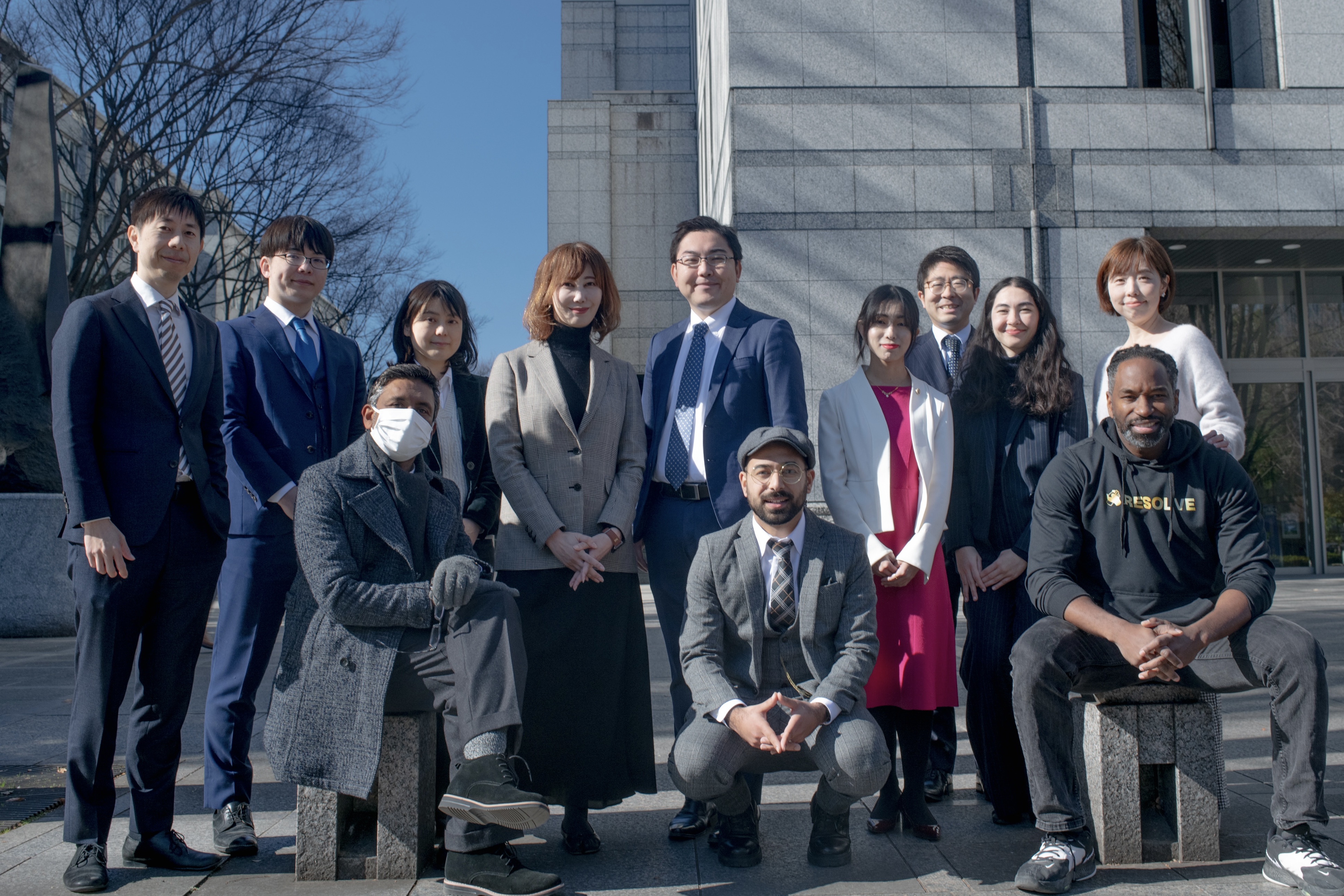
Use of Donations
Litigation expenses:actual expenses for stamps, photocopies, etc.
Opinion writing expenses for scholars:Given the specialized nature of this field, we plan to engage constitutional law scholars, administrative law scholars, and other experts to write opinion letters.
Evidencing overseas knowledge:We are considering conducting interviews and obtaining written opinions from overseas experts. This will require translation fees and standard honorarium expenses.
Travel expenses for lawyers, plaintiffs, etc.:We plan to use the donation to cover travel expenses for plaintiffs and some of their lawyers to appear at the trial, as well as for experts and others traveling toTokyo.
Publicity and events:We would like to use the donation to cover publicity and events associated with the trial.
- Legal fees:We would like to use the donation to cover the legal counsels' start-up fees, contingency fees, daily travel expenses, and related costs.
Legal Counsel Team
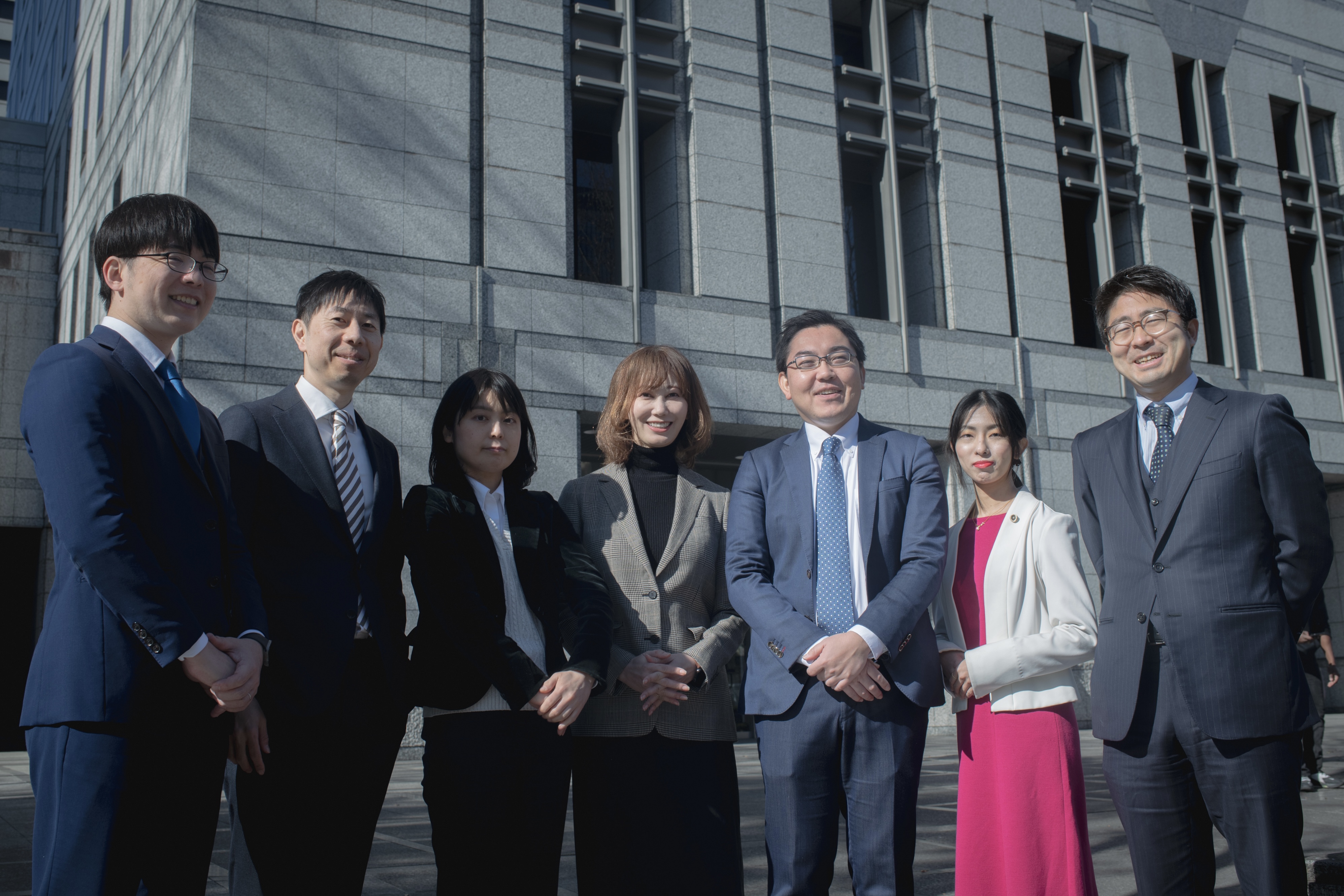
Motoki Taniguchi (Tokyo Public Law Office)
Tomoko Uraki (Shinwa Law Office)
Moe Miyashita (Tono, Tanami & Kosada Legal Professional Corporation, Tokyo Office)
Yoshiyuki Nishi (Goto & Shin-yu Law Office)
Michiko Kameishi (Law Office Eclat Umeda)
Daisuke Igeta (Miyamura and Igeta Law Offices)
Yoshitaka Toda (Law Office LEDGE)
Message from the Legal Counsel Team
Despite being entrusted to "protect" the safety of citizens, police officers often subject individuals to unwarranted "surveillance" merely based on their "foreign" or "foreign-looking" appearance, even when there is no evidence of suspicious activity.
—— Is it right for us to accept a society that permits such conduct?
The accounts of numerous individuals who have experienced racial profiling highlight the pain, fear, and frustration caused by discrimination at the hands of the public authority. Racial profiling undermines human dignity, and it is a pervasive issue that demands rectification.
The message that “racial profiling is a problem that needs to be corrected” can be effectively conveyed through the judiciary — one of the three branches of power. Utilizing judiciary has the potential to bring about substantial change in society even on a global scale.
Together, let us strive towards creating a society that unequivocally rejects discrimination.
Moe Miyashita, Attorney at Law
About LEDGE
This lawsuit is supported by LEDGE. LEDGE is Japan's first citizen-donation-based public interest litigation group dedicated to human rights advocacy and social change. (Some of the lawyers in this lawsuit are members of LEDGE.)

(From the left) Daisuke Igeta, Orie Maruyama, Yoshitaka Toda, Clarisse Ikeda, Motoki Taniguchi, and Michiko Kameishi
Ways to Support
1. Make a donation
・You can make a donation by clicking the orange ‘Support a Case’ button. Your contribution is greatly appreciated!
2. Join our petition campaign on change.org
・Show your support by signing our online petition
-"Stop racially discriminatory police questioning" (change.org)
3. Stay connected
・Follow us on social media to stay updated on our progress and share our journey with your network.
〈連絡先〉
〒160-0022
東京都 新宿区新宿二丁目15番22号 Landwork新宿ビル5階
弁護士法人戸野・田並・小佐田法律事務所(東京オフィス)
弁護士 宮下 萌(担当)
Tel: 03-6709-8511
Email: stopracialprofiling.pj@gmail.com
“Lawsuit to end racially discriminatory police questioning” legal counsel team
We are a group of lawyers that seeks to cast light on the reality of the systemic practice of racially discriminatory police questioning and to argue that such practice violates the Constitution and international treaties.
〈Contact information〉
Landwork Shinjuku Bldg. 5F
Shinjuku 2-chome 15-22, Shinjuku-ku, Tokyo 160-0022, Japan
Tono, Tanami & Kosada Legal Professional Corporation (Tokyo Office)
Moe Miyashita, Attorney at Law
Tel: 03-6709-8511
Email: stopracialprofiling.pj@gmail.com
関連コラム
-
2025. 3. 19
-
2025. 2. 27
-
2025. 1. 31
-
2024. 8. 2
-
2024. 7. 3
-
2024. 1. 29
あなたにおすすめのケース Recommended case for you
- 外国にルーツを持つ人々 Immigrants/Refugees/Foreign residents in Japan
- ジェンダー・セクシュアリティ Gender/Sexuality
- 医療・福祉・障がい Healthcare/Welfare/Disability
- 働き方 Labor Rights
- 刑事司法 Criminal Justice
- 公正な手続 Procedural Justice
- 情報公開 Information Disclosure
- 政治参加・表現の自由 Democracy/Freedom of Expression
- 環境・災害 Environment/Natural Disasters
- 沖縄 Okinawa
- 個人情報・プライバシー Personal information/Privacy
- アーカイブ Archive
- 全てのケース ALL
